#normandy marsh
Photo





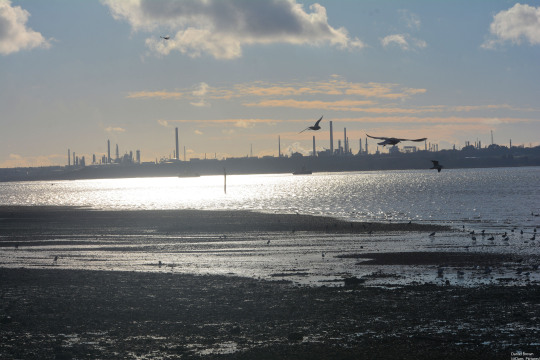




Ten of my favourite photos taken in January 2023 and month summary
1. Bewick’s Swan at WWT Slimbridge, Gloucestershire
2. Nene aka Hawaiian Goose at WWT Slimbridge
3. Curlew at Lymington, Hampshire
4. Kingfisher at Winnall Moors in Hampshire
5. Winter heliotrope at Lakeside Country Park in Hampshire
6. Weston Shore, Hampshire
7. Tar Lakes in Oxfordshire
8. Milkham in the New Forest
9. Sunset at home
10. Frozen lake at Lakeside
What a start to the year I have had for wildlife watching and photos. It was another fantastic start to my birdwatching year with the sheer volume of species we saw, allowing me to have my fastest ever start to my year list being the highest amount of bird species I have ever seen after one month of a year and ahead of what all my other year lists were on at given points on most days. It was a joyful process to lay the foundations of my year list once again seeing so much, with a thrilling mix of trips to wonderful places on our week off to start the year, working day walks and weekend trips making it a unique start to my birdwatching year allowing us to see many sensational species, many so well and a fair few multiple times from Purple Sandpiper to Green Woodpecker and many more in between. Scaup, my first ever Sabine’s Gull, a fair few Goldeneye and Kingfisher seen, Short-eared Owl, Glossy Ibis, Slavonian Grebe and unexpected Kittiwake are some of many other top species seen this month.
It has been a brilliant start to my mammal year too especially deers and especially Roe Deers with many seen. I even managed to see an unidentified butterfly during it all with spiders continuing to shine throughout the month for me at home. It was a great month of flowers even if not too many were around with some seasonal delights which I so enjoyed seeing and some seen that will come to the fore in weeks to come as I enjoyed seeing plants and fungi too generally. I took in so many beautiful landscapes and sky scenes in different parts of the country in many brilliant bits of sunny weather, with frost and ice as well as dramatic bare tree scenes, the wet landscape with the amount of rain too and gorgeous seasonal light bringing that winter flavour to the month. I am happy to have taken so many photos this month including many I am pleased with. I hope you all have a good February.
#january#bewick's swan#nene#hawaiian goose#curlew#kingfisher#winter heliotrope#wwt slimbridge#lymington#normandy marsh#winnall moors#lakeside country park#weston shore#tar lakes#milkham#new forest#sunset#home#lakeside#england#world#oxfordshire#hampshire#gloucestershire#dorset#kittiwake#purple sandpiper#green woodpecker#goldeneye#short-eared own
2 notes
·
View notes
Text
DEAUVILLE and STE.-MÈRE-ÉGLISE, France (The New York Times) — For many, it will be the last big commemoration. The last reunion.
Eighty years after Allied armies invaded the beaches of Normandy, marking a definitive turning point in World War II, those veterans who are still alive and sound enough are expected to return to France this week from the United States, Britain and Canada to commemorate the moment — gingerly, slowly, happily.
They number less than 200. Their average age is about 100.
As some of the veterans arrived on Monday, descending from a hulking 767 onto the tarmac of the small Deauville airport — sometimes helped by multiple aides — many of those there to greet them grew teary in between their bursts of applause.
For a place saturated in the history of that grand landing, when some 156,000 Allied soldiers arrived on the coast and began to push the occupying Germans out of Normandy and then out of the rest of France, there is a deep sense of nostalgia.
“It’s very emotional,” said the airport director, Maryline Haize-Hagron, who like most Normandy natives, has an intimate story of D-Day. Her grandfather Henri Desmet, after watching American parachutists land in the marshes near his farm on June 6, used his flat-bottom boat to row dozens to dry land so they could continue fighting.
“It’s such an honor to be able to welcome them back,” she said.
Mr. Desmet, like most witnesses, is dead now. And this anniversary comes at a time that feels darkly critical — there is a war in Europe, far-right movements are gaining ground across the continent, there is a shifting politics of anger.
The veterans, for their part, have individual reasons for returning. Some come to honor their fallen comrades. Others want to enjoy the pageantry of it all, one last time.
#World War II#D Day#Operation Overlord#Battle of Normandy#France#United States#Canada#Great Britain#United Kingdom#Normandy#New York Times#news
2 notes
·
View notes
Text
22. Gilded Summer
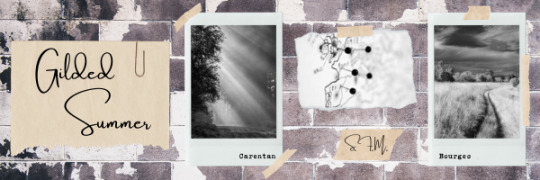
Sutton Flynn-Marshall
Taglist: @thoughpoppiesblow @wexhappyxfew @50svibes @tvserie-s-world @adamantiumdragonfly @ask-you-what-sir @whovian45810 @brokennerdalert @holdingforgeneralhugs @itswormtrain @actualtrashpanda @wtrpxrks
~~~~~~~~~~~~~~~~~~~~
As the June breezes took wing, the Normandy invasion proved a resounding success—but the operation did not come without its grief.
D-Day came and went with little warning and far more turmoil than even Dick had expected. Always a cautious man, he'd prepared himself for a hundred different circumstances while awaiting the drop, his feet securely planted on English soil. And yet, despite all his preparation, France managed to surprise him time and time again in just a few short days. He lost his rifle in the jump, which did little to soothe his initial angst upon landing in such unfamiliar territory. He'd studied the maps and run the drills repeatedly over the past few months, but the real thing was different. He'd always known it would be so. Just not this different.
Men died. Men lived. Men were shot. Men got out of a skirmish unscathed. The hot, sunny days began to blur as Allied forces pressed southward into the mainland of France. The 101st Airborne met resistance here and there but never with enough force to deter their advance. Dick got his hands on another rifle, probably stripped from some poor soul with a sheet covering his head, waiting to be buried in the army plots already springing up in occupied towns up by the coast. Nix came riding into the rendezvous point on a tank and Harry and Buck both showed up a few minutes later. The only person they were missing... Dick couldn't think about her. Not here. Not in this place. He found the enlisted men of Easy Company and, just as soon as he'd arrived, left to make a tactical assault on Brecourt Manor. They lost a man there, Private Hall. Dick had only known him a few short hours, and yet thinking about being the commander to send him back to his mother in a box made his stomach turn. He was thankful that wasn't his job.
A week and then some after D-Day, Easy Company stopped to rest for the night after a taxing march through the better part of the evening. They'd traversed hills and dells on the path to Saint-Marie-du-Month; now, they braved swamplands and marshes on their way to Carentan. The boggy surroundings filled the soldiers' boots with lukewarm water and now caused the medics to scurry around to pass out fresh socks, all of them anxious to prevent trench foot. In the early hours of the morning, counting down the minutes to the sunrise, Dick accepted a pair from Doc Roe and slipped out of his boots to peel his wet socks off his sore feet. Beside him, Harry rubbed his feet in the grass until a bug of some sort bit him and he started to curse, jumping up and down until he was satisfied he'd squished the nasty thing. A few feet away, Nix didn't even stir on his bedroll. How he managed to sleep anywhere at any time, Dick would never understand.
"Saved my chute," Harry mentioned as if they'd already been talking about it as he plopped back down onto his poorly-laid-out bedroll. "It's silk, you know. Gonna send it back to Kitty."
He flashed a broad grin.
"Think it'll make her a fine wedding dress, don't you think?"
At first, Dick just nodded—Harry had told him this several times already—but then a thought came into his mind and stuck around. Harry pulled his chute out of his pack and refolded it, just as he did every night. The fabric often crumpled up throughout the day during their trekking and Harry's frequent, messy searching for one thing or another in his pack, so whenever they stopped for a while, he got the chute out and smoothed it all neat-like, as if he'd be presenting to Kitty tomorrow. He wouldn't see his fiancée for some time. None of them would see their loved ones for a while yet. Dick didn't say anything like that, of course. While not the most optimistic, given the circumstances, memories and dreams of home past and future were sometimes all they had. After a moment's more thought, Dick reached into his breast pocket and took out the folded photograph Sutton had left him the day she left Aldbourne. A month had passed since then. Dick looked at the photograph at least twice a day, though he tried not to look for too long. It wasn't his place. He still didn't know why she'd left it to him, but she had. And it meant something to him.
"Here."
Dick held out the photograph, and Harry, once he'd carefully guided his silken parachute back into his pack, accepted it with a curious smile. He unfolded it and his grin grew at once, just as Dick knew it would, but before he could say something teasing, Dick spoke.
"What do you think it means?"
"The picture?" Harry turned it over and read Sutton's handwritten message. "Or this? The note?"
"Both. No, just the photograph." Dick had studied her words long enough to make plenty of sense out of them. It was the picture he still didn't understand. "Why me?"
Harry snorted a laugh and pressed his face into his elbow to quiet his laughing, apparently not realizing Nix wouldn't have woken for anything but the morning. Dick held back a sigh as Harry shook his head over and over, then finally lifted his head and returned the photograph.
"She adores you, Dick," he said, sounding a little exasperated but too fond to really say so.
"I don't know about that."
"Well, I do. She feels safe around you."
Dick's gaze shot up from the grass swaying lightly between his boots.
"She told you that?"
One side of Harry's smile crawled up higher than the other.
"She didn't have to."
Dick wilted a little, and Harry seemed to notice.
"What? You don't believe me?"
"She trusts you more," Dick started to reply, but Harry was already cutting him.
"Yeah, right. She doesn't look at me the way she looks at you."
Dick could feel his face getting warm and thanked the night for hiding his heightened emotion.
"She doesn't look at me any kind of way. If she did, don't you think I would have noticed?"
"No," Harry said, and Dick was surprised at his sudden switch in tone from lighthearted to serious. "No, and you know why you never noticed? Because you never went looking for it. You never actually looked."
"I looked," Dick muttered, but Harry didn't hear.
"Dick, hey. You were so focused on making sure she liked you—a noble pursuit, don't get me wrong—that you totally overlooked how much she ended up loving you."
Dick took his helmet off his head and laid down on his bedroll. He didn't have anything to say to that, and it was all he could think to do was end the conversation there.
"You know I'm right," Harry said, reluctantly lying down as well. "Think about it. And get some sleep. Maybe you'll have figured it out by the morning."
Contrary to Harry's hopeful supposition, Dick had not figured "it" out by the morning—in fact, he'd only confused himself more, and so determined to stop thinking about the photo once and for all. He failed right after breakfast, when he took it out of his pocket without even thinking and couldn't put it back until he uncreased the fold and looked at her face. As he tried to convince himself to put it away, Harry sat down on the curb to his left, noisily eating his porridge-type breakfast (Dick had preferred to scrounge up an apple and a wedge of cheese than to trust army cooking, as friendly as Joe Domingus was). He didn't have to see what Dick was looking at to know what it was, and Dick put it away in his pocket at once. Just then, a few of the enlisted men wandered past. Joe Liebgott stopped, raising his hand in a casual salute, and Dick rose to answer the question he could see coming.
"Sir, how soon d'you think we're gonna get outta France?"
"Soon," Floyd Talbert laughed before Dick could venture a guess. "You know he's gotta get back to that London girl he loves!"
Dick could see from the look on the two men's faces that his expression had surprised them, and they quickly apologized and scurried after their pals. Displeased at his own reaction, Dick sat back down on the curb and shoved Harry's shoulder when he caught his friend snickering.
"Hey, c'mon, we both know they're right."
"No, they aren't. They're not right."
Harry gave him a look. Dick sighed, dropping his chin against his chest.
"She's from Colchester, not London," he corrected, and Harry slapped the cobblestones with the palm of his hand out of glee.
"Wipe that smirk off your face," Dick added, pulling back his sleeve to check his watch. "We've got to get moving."
"Oh, yeah? Or you'll what?" Harry cackled. "Kiss me? You'd better save that honor for the honorable Lieutenant Sutton Flynn-Marshall from Colchester-"
"Just Sutton, Harry, you know she doesn't like her surname."
"Right, yeah." He shook his head, a small smile still stuck on his lips. "I don't quite have your memory for those sorts of things."
Adjusting the straps on his pack, Dick stopped in the middle of the road and turned to face his friend, trailing behind with his porridge bowl still in hand.
"What sorts of things?"
Harry shrugged. "You know. Sutton sorts of things."
Dick pressed his lips together, displeased, but Harry just sauntered on forward and clapped his hand on his shoulder.
"Come on, slowpoke. You said it yourself—we've gotta get a move on if we're gonna make it to Carentan today."
Many miles away—but closer than Dick knew—Sutton was dealing with her own set of problems. She hadn't thought once about the photograph she'd left for Dick in the month since she'd left Aldbourne. She didn't have the time for it. She'd been positively swamped by her emergency redeployment. As soon as she returned to the London office, it became clear they hadn't meant to send her back in for this particular operation, but one of their better operatives had been killed and they had no time to find anyone else. At least Sutton knew she was wanted for her quick learning abilities. Once told, she knew better than to show her surprise at her chosen destination, but she managed to show relief, instead, which seemed to translate as eagerness to her superiors. They, inturn, threw her right into the deep end. Day and night, she memorized maps, fake names and birthdays, fake nationalities, fake accents, fake backstories: the whole lot. She'd be traveling with another operative for the first leg of the journey, after which they'd separate and she'd continue to her assigned post while he went on to his. Neither agents were told each other's true names nor their designated arrival points for optimal secrecy of the mission.
"I know it isn't what you might have expected, with your skillset, and all," supposed the strong-browed gentleman whose name Sutton was never given, "but this is where we need you, and I'm sure you won't disappoint."
"I won't, sir."
She couldn't tell if he believed her or not, but it didn't matter, in the end. Whatever he thought of her, he'd still be sending her into France just a week shy of the Allied invasion, and she'd still have a job to do. She'd get it done. It was a much more immediate appointment than the last she'd undertaken, but no less risky. She was to locate the police station of the former Vichy France—now under complete German occupation—in the former border town of Bourges, acquire the file the sympathizing police had been keeping on a known SIS operative in the region, and burn those records to a crisp, then get out of Bourges and head north in whatever direction she could until she met up with the invading Allied forces. The plan hinged on the success of the Normandy operation. Sutton's superiors and even her fellow spy seemed surprised at her confidence that the invasion would bear fruit. She kept it to herself just why: she believed that with men like Dick Winters spearheading the advance (even if it was only for a single company), they could hardly expect to fail.
The operation went as smoothly as it could have given the time, the place, and the situation in which she'd attempted it. Smoothly, at least, in Sutton's book, which meant she made it out alive and reasonably unharmed. She and her companion crossed the English Channel on a hired fishing boat bound for the border coastal town of Hondarribia, Spain. From there, they snuck across the border in the dead of night, encountering several delays that cost them nearly three valuable hours of darkness. After nearly getting caught by a small patrol of border guards, they split up much earlier than planned, but their tactic worked and they each lost the guards. Sutton learned several days later that her companion had also escaped and made it to his destination from her contact in Bourges. She found the police station, determined a point of entry, and broke in through a ventilation unit leading into a storage closet two nights after arriving in the city. She fled northwest, hoping to disappear like a ghost in the night, and strangely discovered that her path toward the sea was oddly devoid of troops and other Nazi personnel. She wouldn't know until after the war ended that Hitler had remained convinced that the Allied invasion of France would begin at Calais, not the beaches of Normandy, and had redirected most of his armed forces to the far northeast—the opposite of her travel route.
Days and nights passed with Sutton sleeping in haylofts and on mattresses in abandoned houses. She tried to stay out of these empty homes unless she had no other option, for the uncanny quiet of people being missing disturbed her so much she could hardly sleep. Barns proved her best option and remained that way until the morning of June 18th, when she came over a hill and discovered a signpost pointing toward a place called Carentan. Something about the sunny morning convinced her to follow the road, and she was soon glad she did, for she quickly came upon two American soldiers in a jeep who seemed mighty pleased to meet her. They told her the town was just back that way and they'd only finished up on the eastern half of it not ten minutes ago, then gave her directions as they lamented not being able to give her a ride.
"Forgive yourselves, gentlemen," Sutton implored. "I understand. Duty calls."
The two Americans drove off, one of them waving his helmet at her in farewell, and Sutton continued down the road, keeping her bearing north until she spotted the town. Still hearing the occasional exchange of rifle and machine gun fire, she strayed toward the eastern side of the town and took the long way around through the field, which proved the more dangerous route. A bleeding German shot at her from within a bush but was gunned down as soon as he moved by a soldier in the upper window of the building above her. As soon as she knew she was safe, she looked up and waved at the man, who leaned out of the window and told her if she was a civilian, she'd better get moving.
"I'm not," she called back, raising her hand to see him better against the sunlight over the rooftops. "I'm coming up north from Bourges."
"Hey, you sound British," the soldier exclaimed in surprise. "Do I know you?"
"You might. Are you with the American Airborne?"
"I sure am!"
The man ducked back into the window, then came back with another man.
"I thought that was you down there!" the second man exclaimed. "How on earth did you end up here, Lieutenant?"
Sutton couldn't help but smile, and smile wide, for the first time in a very long month. Lieutenant. Yes, that's what she was to these men. A figure of respect—and if not that, she was at least someone to be known.
"If I told you, I'd have to kill you," she joked, but then quickly had to explain she was only kidding when the two men looked alarmed.
"Yeah, yeah, of course," the second man laughed, and Sutton did think she could recognize him if she tried. "There's a checkpoint a few hundred yards to the east, they can let you in there. Might have to show 'em some papers or whatever, but I'll send somebody on over to let 'em know it's you."
"I'd appreciate that. Thank you... Sergeant."
The man beamed, and as Sutton continued on through the choppy undergrowth in the direction he'd indicated, she heard him say to his companion—
"You hear that, Smokey? She remembered me!"
"Yeah, yeah, save it for the pub. You want me to run over? Got nothin' better to do up here."
"What, nothin' better than shootin' Nazis in the bushes?"
Sutton lost track of the conversation as she went further away from it, but by the time she reached the checkpoint, a runner had arrived, and it wasn't either of the men from the window. They had her present her false French identification for posterity's sake, and even though they knew she wasn't Marguerite Dupont, they called her by the name until they let her through the gate. One of the men tried to hug her, but Sutton carefully declined and quickly accepted the offer of a boyish-looking fellow to take her to find somebody she knew better than any of them.
"You, uh, used to hang around Battalion a lot, right, Miss? Erm, Lieutenant?" the soldier asked, swinging his rifle nonchalantly between his hands. "Think I know where to find one of 'em. We lost the whole of Headquarters on D-Day, don't know if you heard—the Krauts blew their plane to pieces—but we've still got who's left floating around here somewhere. Most of the boys still haven't gotten over the shock. I know I haven't. Oh, how about Welshie over there? Erm, Lieutenant Welsh."
Sutton didn't mean to abandon the young man in the street—he had been helpful to her, despite his rambling—but Harry Welsh had just jumped up from the stone steps of a church, a grin splitting across his face, and she couldn't help but go to him at once. She'd only taken a few steps before a man cut her off, and she stepped back, caught by surprise and alarm. She didn't remember his name, but she knew she'd met him before; his distinctive face conjured up disagreeable memories for her.
"I just had to see it for myself," he said, blinking at her with oafishly wide eyes. "A woman, in a warzone."
Sutton tried to step around him, but he stopped her again. She would have shoved him away from her if she'd had any nerve, but she'd stopped caring about bullies like him some time ago. Instead, she did the one thing she felt right in doing and instructed him coolly to move out of her way.
"I've spent years in occupied Europe, Lieutenant," she added. "You and all your Americans aren't the first to come here. You're not special."
"Hell, Snider, leave off the woman," Harry said sternly.
"And stop gaping," Sutton added, her bravery bolstered by his presence. "It won't help you look any less like a rat."
As Snider—that was his name, she was sure of it, now that Harry had reminded her—stormed off, swearing things that would have made his mother faint, Sutton stepped up to Harry and hugged him before he was done asking her if he could hug her. He quickly caught her up on Easy's operations in France and made sure she got a bite to eat, then started to tell her about how he'd been saving his silk chute for Kitty's wedding dress—she thought it was sweet and told him so—before trailing off halfway through waxing poetic about his darling. Sutton felt bad for losing focus, but sitting still made her antsy despite her poor feet, which ached after days of cross-country travel in poorly made shoes. And besides, while she was thrilled to see Harry again, there was someone else she was doing a poor job of pretending not to keep an eye out for.
"I'd go on for hours if you didn't stop me," Harry laughed, waving off her apology when she started to give it. "Finish your bread and then we'll go. I can see you're frothing at the bit to see Dick again."
"Dick's here?" she asked, and her weak attempt to insinuate false ignorance made Harry laugh.
"Where else would he be?" he teased, his grin as persistent as the clouds coating the sun overhead. "Come on. We'll walk and talk."
The medbay was relatively quiet that afternoon. The battle had been over for nearly a week, and accordingly, things were calming down around Carentan. Dick had been sent by Colonel Sink himself after a meeting considering what the next few days would hold for Easy Company. Humbled enough by how wrongly he'd imagined disguising his limp, Dick complied. Doc Roe didn't have to voice his displeasure with his commanding officer for Dick to understand his several days of skipped check-ups had not won him any favors. So he sat still and let Roe do his job, managing to hold back a wince when the medic poked at the stitches. The westward-facing door opened after a time, and as Roe went to fetch a fresh bandage, Dick listened for the new arrivals. He could hear Harry coming around the corner, blabbing about how Dick had taken a bullet ricochet last week, and just as he ducked his head, a small smile of exasperation on his lips—
"You've been shot?"
It seemed France had not had its fill of surprising Dick. His head moved with such a speed that his neck twinged, but he hardly felt it, mesmerized by the sight before him. Sutton was walking directly toward him at a clipped pace, eyeing the wound on his leg, and he was so astonished that she was here and that her first words to him were of such concern that all he could think to say was what first came to mind.
"I'm fine, Sue—I'm fine, really."
He stared at her, and she stared back. He'd never called her that before, and the endearing nickname hung in the air like an unanswered question neither of them wanted to touch. Doc Roe cleared his throat, and Harry hooked his arm around Sutton's, backing her up toward the door they'd come in through.
"We'll come back later. Sorry to disturb you, Doc. Dick."
Roe mumbled something and went back to looking at Dick's leg, and all Dick could do was lift a hand in a meager wave after his friends had already gone.
Trying to free her from her distraction, Harry took Sutton to see Nix next. He nearly fell out of his chair when she came in through the door, and he hugged her after asking if he could. He pulled up a chair for her (but made Harry sit on the floor) and caught her up on everything Harry had been too absentminded to tell her before, starting with Meehan and the rest of HQ going down in their plane—news which Sutton had started to glean from her guide earlier but still made her queasy now to truly know it had happened—which resulted in Dick's sudden promotion to Easy's commanding officer and his immediate deployment to capture the German guns on D-Day. He'd led that operation.
"And Speirs here was there, too," Nix added, and Sutton and Harry turned to find the lieutenant standing in the doorway, listening in on the report. Sutton stood and shook Speirs' hand, which seemed to surprise him, but not in a bad way.
"Glad to see you're still alive," he told her, and Sutton echoed the sentiment in kind.
"Oh," she said, reaching into the small knapsack she'd managed to fill up halfway during her travels north, "I've got something for you."
She presented a fine lighter, which Speirs readily took, that she'd picked up a few days prior on the road. With the ground so trampled, it must have been dropped by a German soldier some time beforehand. She'd left that road quickly, made uneasy by the fresh tracks, but the lighter had given her something to do for an hour or two that night as she waited, restless, for the sunrise. She'd polished it up and now gave it to him; he thanked her and told her he'd go put it to use right now. As he left, Sutton shut the door behind him (lest any other eavesdroppers appeared) and found Harry practically aghast behind her.
"I smoke, too!" he exclaimed, dismayed that the gift had been given to someone other than himself, and Nix chimed in just the same.
"Shh," she told them both, waving her hands to pacify them. "This will keep him from nicking some poor private's family heirloom. At least, it will for a little while."
Harry cracked a smile, and Nix rolled his eyes as Sutton sat back down in her chair.
"And besides, you haven't been forgotten," she appeased them. "I did find something for each of you."
First, a decanter of whiskey for Nix.
"I know it's not your usual, Lewis, but I did my best."
He whistled and took it from her, admiring the fine glass, and Sutton felt gratified that she'd carried the heavy thing all this way from Bourges just for him.
"Sutton, I could kiss you."
Shying away, she mumbled her disapproval of the idea, and he laughed fondly.
"I'm just kidding, relax. That's somebody else's job, not mine."
Sutton felt her ears start to flush pink and wished it were cold enough to justify pulling up her collar to hide how he'd flustered her.
"Speaking of Dick," Harry chimed in, "did you get him something, too?"
"I did," Sutton replied evenly, drawing Harry's gift out of her pack, "but that's for him and not you. This, on the other hand-"
She gave him the silver hairpin she'd picked up just outside of Tours and watched his eyes light up.
"-is for you. Well, for your fiancée."
Harry sighed happily and turned the hairpin over in the light to examine its fine craftsmanship.
"You know me so well."
Nix returned to recounting Easy's exploits across the northwestern part of the coast, though it didn't take him long to catch Sutton up to speed with how they'd taken this very town—so it was Carentan, she'd followed the signpost correctly—just a week ago. It had been a hard-won fight. They'd lost men, more even than on D-Day, but the company persevered all the same. Sutton didn't want to think about any of that too much. The idea of so much unnamed loss reminded her of her unknown companion somewhere out there in the south of France, still deep in the Nazi-occupied country. If he was still alive, that is. His operation would be more drawn-out than hers had been—it had been planned for much longer, due to its greater risk.
"So, the point of the matter is, Dick will make Captain just as soon as we move out," Nix concluded. "I'm sure of it."
He seemed pleased at how pleased and proud Sutton seemed on Dick's behalf, but before she could remind him it was only because Dick was her friend, a knocking came on the door, and Dick himself arrived, accompanied by Lieutenant Buck Compton.
"Would you look at that, Winters?" Compton exclaimed, grinning from ear to ear as he seized Sutton's hand to shake. "It's the pretty Brit I met back in Aldbourne. What a sight for sore eyes you are, Lieutenant."
Sutton hummed her thanks a bit awkwardly, distracted by the jealousy she saw flickering through Dick's eyes. It couldn't be jealousy, she'd clocked the feeling wrong. She must have. Jealousy wasn't a friend of Dick's—right? Did she know him well enough to make that claim? And if he was jealous, what did it mean?
"Hey, Buck, why don't you come and see this gorgeous thing I've just picked up from a little birdie who knows how to give good gifts?" Harry suggested as he smoothly guided Compton back out of Nix's makeshift office with a hand on the lieutenant's shoulder. "Not sure what you'd call this design here, but Kitty's going to love it..."
A jeep horn honked outside and Nix got up from his desk.
"I'll be right back." He pointed at his two friends. "Behave."
Dick chuckled, so Sutton felt free to join in. He looked happy to hear her laugh, but she couldn't make it last long, nervous to be in his presence again after their time apart. She didn't expect him to think of it that way—as if her absence meant something vast to him the same way it meant something vast to her—but maybe he'd missed her, just a little.
"I brought you something," she said at the same time he said, "I kept your picture."
She paused, then asked, "What?" just as he did the same.
"You... for me?"
"Yes," she said, taking the escape he'd awkwardly provided to go digging through her knapsack. "I got it for you when I was- well. I can't say, but... South. I got for you while I was south."
She'd bought him a pocketwatch. Not that she would tell him she'd spent any money on him—she'd picked everything else up along the road—but she'd ended up in a secondhand watch shop while hiding from an S.S. patrol and the watch reminded her of Dick so strongly she hadn't even realized she'd bought it until it was in her hand. As she gave it to him now, their fingers brushed, and she pretended not to notice, pulling her hand back like she'd noticed nothing special about him at all. The watch was brass but gilded in gold on the handsome lion crest on the back and the hands of the clock. The crest likely represented some family, but Sutton didn't know who or from where. All she knew was she thought Dick would like it. And from the smile creeping up his lips, she'd been right.
"It's right on time," he said as he looked between the hands on the pocketwatch and then those of his wristwatch. "Exactly right on time."
Before Sutton could express how happy that made her to hear—how happy it made her to hear his voice—Nix came back in with two boxes stacked haphazardly in his arms, and Dick stepped aside to help, carefully placing the pocketwatch in his breast pocket as he moved. Sutton caught a flash of white photo paper as he flipped shut the flap of the pocket and wondered if it could be her photo before dismissing the idea as wishful thinking. The breast pocket was where soldiers kept pictures of their girlfriends and fiancées and wives—pictures of the women they loved. It wasn't like that, with Sutton and Dick. They were only friends—even if Sutton would have married Dick tomorrow if he'd asked her to. But she'd never tell him that. And he'd never ask.
A runner came in just as Nix and Dick were setting the boxes down on the desk and informed Dick rather impatiently that something had come up on the other side of town and they needed him there immediately. Sutton instinctively tried to follow, but Dick insisted she stayed back, squeezing her hand briefly on his way out the door. She stood by the window, antsy, watching him go, and Nix tried to appease her by telling her Dick is right— she'll only draw attention to herself by trying to help.
"And besides," Nix added as he began sorting through the papers in the first box, "resting your feet for a little while will do you some good."
"What about Dick?" she asked, still looking out the window.
"What about him?"
"He's limping."
Nix leaned around the desk to see through the glass, following her gaze, then grunted out of amazement.
"I'll be damned, he is. Remind me never to underestimate your powers of observation, Agent."
"It's not much, really," she said, neatly bending one leg over the other as she sat. "When I worked at CP, I sort of... puzzled out whose walking pattern was whose. So I knew who to open my office door for... and who to keep it shut against."
Blowing air out of his nose, Nix pressed his lips together, and at Sutton's suspecting squint, he let loose an unabashed smirk.
"I meant the whole 'you're a spy' thing," he told her smugly, "but I am more than happy to go with the 'I've memorized Dick's footsteps' angle you've got going there."
"Oh, shut it," she replied bashfully, retreating to her chair, and Nix chuckled, putting the lid back on the first box.
"Whatever you say, Agent. Now rest up—I'm sure you've had a long few weeks out there in God knows where."
He set a stool out in front of her, and with a grateful sigh, Sutton lifted her aching feet and gave them a rest as ordered.
"I couldn't have said it better myself. Thank you, Lewis."
"Don't mention it," he muttered, already distracted by his work, and returned to sorting his papers, a task which Sutton peacefully watched him complete for the rest of the warm afternoon.
~~~~~~~~~~~~~~~~~~~~
(Sutton's back! Woohoo! I'm having a little trouble with tagging people so if it doesn't seem to be working, let me know and I'll see what I can do to fix it.)
#sutton flynn-marshall#cobblestones#dick winters#cobblestones 22: gilded summer#sutton flynn-marshall ficlet#band of brothers#dick winters x oc#band of brothers oc#band of brothers ficlet#band of brothers oc ficlet#band of brothers fanfiction#hbo war show#hbo war show fanfiction#hbo war show ficlet#hbo war show oc ficlet#hbo war#oc fanfiction#oc ficlet#fanfiction#fic#long overdue update
4 notes
·
View notes
Text
for anyone who’s interested, here’s an update to that old ask I answered re;
what do you think are steve and bucky's favorite paintings and artists?
I have SO MANY MORE!

Joseph Stella, The Voice of the City of New York Interpreted, (1920/1922.) Catholic stained-glass-style art deco altar piece love letter to NYC, inspired by the Brooklyn Bridge? How tf did I forget to include this in the first answer?!

Richard Eurich. Preparations for D-Day 1944.

Edward A. Reep, Smoke Screen at Livergnano, (Italy, 1944)
I thought these two ^ would pair interestingly with Thomas Moran’s ‘The Chasm of the Colorado’ (1873) from the other post.
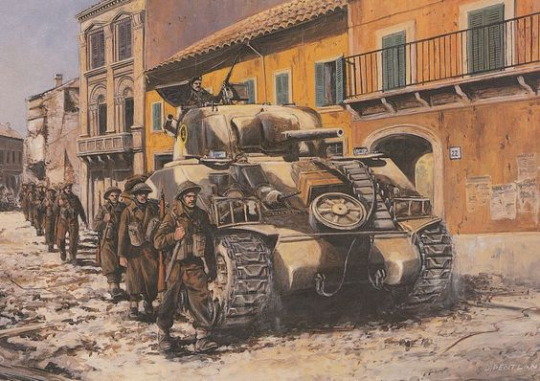
Anzio Italy Battle 1944 Irish Guards Tank Regiment. WW2 Military Painting Postcard.

Guy de Montlaur, One June Early Morning, (1972). It was inspired by the Normandy invasion, on June 6, 1944.

Edouard Cortes, Parisian Scenes (1935) ...But surely Steve and Bucky and the lads must also have had some happy times in liberated Paris?

Daniel Ralph Celentano, Mending. Sarah Rogers at home vibes; in this house we acknowledge her existence!

Daniel Ralph Celentano, Wine Making. Barnes Fam at home vibes??

This sweet series of ‘WWI Women Doing Mens Jobs’ watercolours by Victoria Monkhouse, showing: a female post-mistress, bus conductor, and window cleaner, respectively.
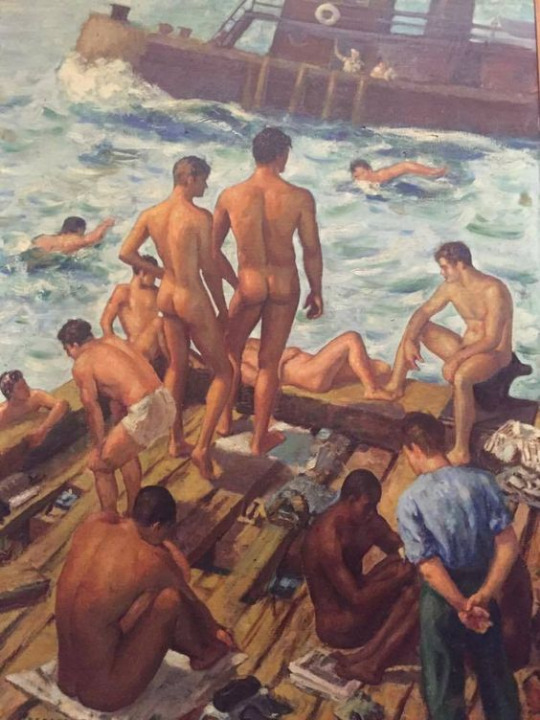
Edward Casey, Stevedores Bathing Under the Brooklyn Bridge, (1939). Bucky works on the docks for the money? pff yeah sure.

Vincent Van Gogh, Prisoners' Round (after Gustave Doré), (1890). Pretty apt given Bucky’s escape from imprisonment into nature (notice the butterfly top left!) and Steve’s meteoric rise to fame as a prison-escapologist!
And speaking of butterflies...

Jean-Jacques Bachelier, White Angora Cat Chasing a Butterfly, (1761).
I also had an idea about Steve and Bucky (especially) pairing disconnected paintings together in darkly comic diptychs, when they hang them up in their home.
So here are some examples!
.
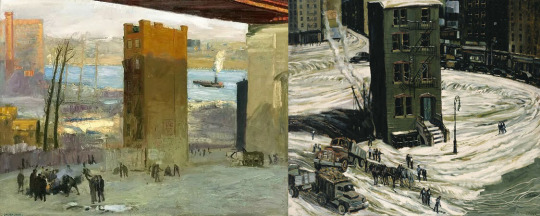
George Bellows, The Lone Tenement, (1909). / John R. Grabach, The Lone House, (1929). If Steve and Bucky Were Sentient Tenement Buildings AU 10K

Joseph Hirsch, Mercy Ship Navy Hospital Ship USS Solace, (C. 1943) / Nurse in Newfoundland, (World War II).

Van Gogh, Shoes, (1888) / Wicked Witch of the East's ruby slippers, The Wizard of Oz (1939).

^ For when Steve’s inner Mama’s Boy is showing (i.e. always...)

...and for when Bucky’s inner gay is showing (ie. always) Tom of Finland sketches.
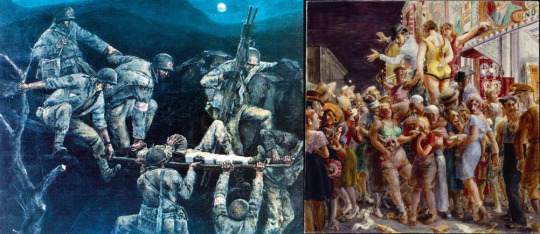
Joseph Hirsch, Night Shift, (Italy 1944) / Reginald Marsh, Wonderland Circus, Sideshow Coney Island, (1930). I think of these two as ‘Bucky’s Two Experiences of Night Life In the 40s’ diptych.
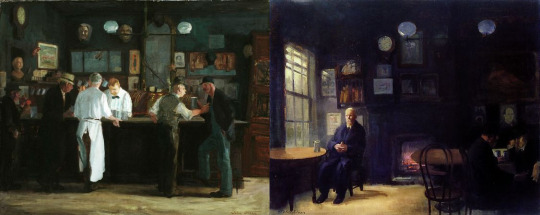
John Sloan, McSorley's Bar, (1912) / McSorley's Back Room, (1916). Contrast post-serum Steve preferring a nice quiet Irish bar, with a mens only rule 😬.
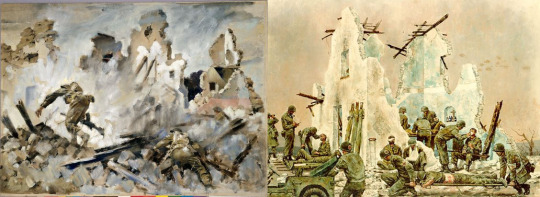
Peter McIntyre, Into Cassino, (May 1944) / Joseph Hirsch, Company in the Parlor, (Italy, 1944). These are Bucky’s pics from his time fighting in Italy; by the time Steve got there ruins is all he saw!
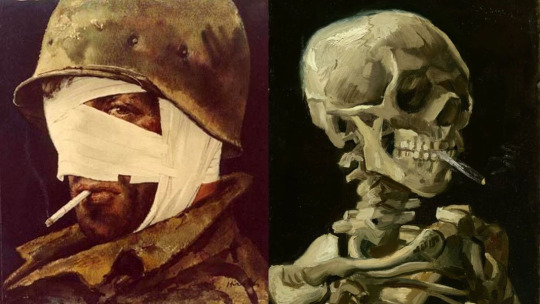
Joseph Hirsch, High Visibility Wrap, (Italy 1944) / Vincent Van Gogh, Skull of a Skeleton with Burning Cigarette, (1885-6). And these!
#long post#art#art nerd steve#steve meta#steve rogers#stucky meta#artist steve#historically accurate stucky tag#bucky barnes#bucky meta#fanfic inspo#painting#meta#stucky#dat's me#*will put under a cut for length later*#art nerd steve my beloved#srsly if he was colourblind before wtf did steve think when he first saw eg. the impressionists? the fauvists??#😲🤯#my meta
17 notes
·
View notes
Text
Fire On Fire: Chapter 7
(Ch. 6), (Ch. 5), (Ch. 4), (Ch. 3), (Ch. 2), (Ch. 1)
Gallery II Taglist Application II Symbol Guide

Summary: In the immediate aftermath of the D-Day jump, Alix navigates confusion + carnage with an unexpected ally and Lewis Nixon confronts the frustrating realities of mentorship.
WARNINGS: Death, War stuff, Gentle bullying
Dedication: To my dear friend Poet who tirelessly puts up with me & my ramblings. Thank you for believing in my writing when I couldn't even believe in it myself.💖💖💖
Taglist: @latibvles (...)

Contemporary: June 6th, 1944. Normandy, France.
As jump conditions went, it could hardly have been worse. The wind was brutal, howling in Alix’s ears like a banshee as it sent her lurching off-course like a ragdoll being tossed across a playground.
The initial prop-blast as she'd jumped had snapped the chin-strap on her helmet like a twig and she knew it would only be a matter of time until it fell off.
Tracers whizzed past, lighting up the sky as they went, the bright streaks like sparklers missing her by mere inches, and she tensed in a vain effort to avoid them as she drifted precariously earthwards.
All around her, the night sky was dotted with fellow paratroopers and Alix strained her eyes, desperately trying to locate any familiar frames but she couldn't tell who was who in all the chaos.
After what happened to her brother at Pearl Harbor, she'd stopped going to Mass but even still, she mumbled a prayer for the others: for Joe, Skip, and Don, for the rest of Easy, begging whoever was listening to keep them safe.
In the distance, fire and smoke spiraled across the sky as a dark shape hurtled down toward the ground at break-neck speed. It collided with the Earth with a booming noise, sending flames erupting over rows of what she could now see were fields of crops.
Clutching her bag to her body with white knuckles, Alix wondered if that had been one of their planes now engulfed in the inferno below…
No. She pushed the thought out of her mind as quickly as it had entered. She couldn’t afford to think about that. Not now.
The Earth was rushing up at her faster than she'd expected– she hadn't even noticed her chute opening– but as soon as she touched down, Alix knew something was wrong.
Instead of solid ground beneath her, she found herself sinking rapidly into a marsh, her boots already disappearing under the brackish sludge with a squelching noise.
The mud was halfway up her calves now but its pull was so strong and her gear so heavy that she could scarcely lift her legs.
Fighting to keep herself from panicking, Alix began scrambling to remove all unnecessary equipment, starting with her heavy gloves so she'd be able to handle things quicker. Tracers continued to light the sky overhead like nightmarish fireworks, illuminating the marsh in ghostly flashes of white and green.
Thinking quickly, she managed to free her Red Cross satchel and tossed it as far away from the water as she could.
It landed with a thump on a tiny strip of dry land a couple feet in front of her and she breathed a small sigh of relief.
At least the radio and her important documents were safe.
Realizing she'd already lost her helmet somewhere along the way down, she began to struggle with her parachute and reserve next, swearing under her breath as the muddy water surrounding her only continued to rise.
Just above her knees now, it was steadily creeping up her thighs. It would be at waist-height in no time and she would soon be dragged under completely by the weight of her gear.
Reaching down into the brackish swamp-water, she groped desperately for the knife she kept tucked into her boot. Yanking it up out of the mud with all her might, she hurriedly cut herself free from her accidental restraints before sloshing toward the edge of the marsh to grab her bag.
After cleaning her knife off and returning it to its sheath, Alix had almost made it out of the muddy water when she bumped into something solid. As she squinted to inspect it, she felt her stomach drop.
It was the body of a paratrooper, caked in mud and moss, floating face-down in the swamp water, the suspension lines of his parachutes wound around his head and neck like a perverse burial shroud.
His hands were clawed, fingers forever locked around the tangled cords like a vise in his final desperate attempt to loosen their fatal chokehold before the bog water had dragged him under.
Alix felt cold dread seeping into her lungs, chilling her worse than her sopping wet clothes.
What if it was Joe? Her Joe?
He had jumped right before her so locationally, it made sense he would have landed near her and the wind was bad enough to twist up the chutes. The drowned trooper was too tall to be Skip and too lanky to be Don, but he was built like Joe from what she could see-- thin and wiry...
Drawing her lower lip between her teeth as she bit back the twisting nausea in her stomach, Alix steeled herself to actually touch the corpse.
She needed to check.
She needed to know.
Taking a deep breath, she seized the dead man by the back of the collar and hauled him to one side with a grunt so that she could see his shoulder patch, bracing herself to see the Screaming Eagle that would identify him as 101st.
But it wasn’t there. Instead, clear as day, was a patch of twin A’s on a field of red, marking him as 82nd Airborne.
Alix exhaled, a sick sense of relief filling her.
It wasn’t Joe.
Leaving the corpse behind, the young agent grabbed her bag quickly and trudged onward, out of the marsh and into the darkness of the forest surrounding it.
∆∆━━━━∆∆━━━∆∆━━━∆∆
Despite the roaring of plane engines above and the scattered pops of machine-gun fire in the distance, the forest itself was eerily silent.
No birds singing or rabbits racing around the forest floor, not even a solitary deer passing through— everything lay virtually undisturbed, save for the soft crunching sounds of pine needles bending under Alix’s boots as she walked.
Her eyes darted from tree to tree, searching each shape and shadow for potential danger, and her fingers hesitated just above the flap of her bag, where her loaded handgun was hidden.
She knew she technically wasn’t supposed to carry it openly– nurses didn’t carry firearms so it was a dead giveaway– but walking around empty-handed when there could be Krauts lurking behind every branch made her feel like a sitting duck and she hated it.
Oh what the hell, she thought, dipping into her bag to grab her handgun. This is war after all.
A sudden rustling in the bushes behind her made her glad she had and she whirled around, gun at the ready, just in time to see a tall figure tramp into view.
“Flash,” she hissed, gun barrel still pointed straight at him until she was sure he wasn’t a Kraut in disguise.
“Thund- Oh Christ, not you.”
It was Lewis Nixon or at least, it was supposed to be. The combination of leaves and pine needles clinging sporadically to his sleeves gave him the appearance of a giant, disgruntled vulture carrying a gun.
“Pleasure to see you too, Lieutenant,” Alix remarked sarcastically as she lowered her weapon and tried to stifle a smirk. "Aren't you supposed to be at headquarters?"
"I'm working on it," Nixon huffed, the cloud of his breath hanging in the frosty air. "My compass got pretty banged up on the way down when—" he began brushing off the assorted foliage attached to his person. "— I landed in a damn tree."
Alix nodded, pursing her lips to keep from laughing out loud.
"Well, lucky for you…"
She paused and dug around in her bag for a second before coming up with a tiny compass disguised as a shirt button, holding it up for Nixon to see. "I have this."
Now Alix wasn't expecting praise from her case officer, not by any means, but she certainly wasn't expecting him to snap at her like he did.
"I don’t need your help, Martinelli,” he responded tersely, his jaw clenched so tightly that it looked painful. "I know where I'm headed."
Alix put her hands on her hips.
What the hell did he have to be irritated about? She was trying to help.
"Sir, it'll be quicker this way," she maintained, waving the compass for emphasis. "So just use it and we can get going."
Nixon jerked his head back, brows snapping together.
"Who the hell is 'We'," he demanded. "There is no 'We'. I signed up to be a case officer, not a babysitter.”
God, did he always have to be this obstinate?
Alix fought to keep her tone level.
"The sooner we get out of here, the sooner we complete our objective," she said, forcing a smile through gritted teeth. "So will you please just use the damn compass?"
"I don't remember asking for your input, Agent."
Now he was actively trying to piss her off and Alix could feel it working.
The agent took a deep breath as she tried to restrain herself.
"Permission to speak freely, sir?" she asked, her emphasis on the last word deliberately caustic, matching his tone.
"Permission denied."
But it was too late.
Before she could stop herself, Alix blurted out, "What the hell is your problem?"
Nixon’s expression darkened.
“Watch yourself, Martinelli," he warned.
But Alix was too fired up to stop now.
If looks could kill, Lewis Nixon would've been dead on the spot.
“Lieutenant, you've been trying to force me to quit for two fucking years now," she all but snarled. "Trying to break me mentally and physically so I couldn't get in the field. But guess what–" She gave a sarcastic sweeping gesture. "Here I am. I made it anyway.”
Nixon's intelligence training had served him well because her case officer had one hell of a poker-face. Despite his crossed arms, he was impossible to read which just infuriated Alix even more.
“Santa Maria," she swore, still gesticulating wildly with her hands. "You have had two whole years to be an asshole! Would it kill you to take tonight off so we can at least get where we need to be going?”
“For the last time, I know where we’re going,” he asserted with an exasperated groan. “And I can get us there without your help!”
“Sir, I don’t know why you hate me so much but we both have our orders, so whatever it is, you’re going to have to —"
The sound of boots crashing through brush behind them interrupted her and the pair both whipped around to see a man in a gray uniform and cloth cap charging through the bushes toward them.
A lone Nazi. He wasn’t heavily armed, by any means– no gun in sight– but the knife he was gripping sure didn’t bode well.
Nixon dropped to one knee, finger paused just above the trigger, waiting for a clean shot from his angle, but Alix was not in a patient mood.
Instead, she ran towards the approaching soldier, her heart pounding in her ears as she allowed him to get within five or six feet of her before squeezing the trigger–
Pow! Pow! Pow!
Blood spattered the nearby leaves like a fine mist and the German crumpled to the dirt with a dull thud, the knife clattering harmlessly out of his hand.
Just steps away from the body, Alix froze, the color draining from her own face as she watched the deep red liquid slowly blooming from under the soldier’s head and body like a morbid carnation.
The grotesque image of the bullets colliding with his skull played over and over in the agent’s mind like a macabre film reel. As the gunshots echoed in her memory, she had an epiphany.
One of the shots had been hers, she realized, but the other two weren’t.
So it must've been...
She looked back at her handler, Lieutenant Nixon, who had already shouldered his rifle and was stalking off in the opposite direction.
Pushing aside a branch, Alix followed him, jogging slightly to catch up with his much longer strides, but he didn't slow down at all.
"Hey," she said, about to thank him for backing her up when he abruptly whirled around to face her, cutting her off.
"Blanche, what the hell were you thinking!?" he hissed, dark eyes blazing with barely-suppressed rage. "Running towards a Kraut like that with a fucking handgun, have you lost your mind?!"
Leave it to Lewis Nixon to turn a moment of gratitude into an argument.
“I got him didn’t I?” Alix snapped defensively. “A shot between the eyes on a moving target and all you’ve got for me is chastisement?"
"That's not the point," he hissed again, his fervent stage-whisper the only viable substitute for yelling in the field. "You could've been killed! What if he'd had a rifle?! What if there had been a sniper waiting nearby?! You're not even wearing a helmet, for Christ's sake!"
Nixon turned on his heel angrily, forging ahead once again when a thought came to Alix's mind.
"Wait, who the hell is Blanche?”
Nixon’s pace faltered and for a split second, he looked like an animal trapped in the path of a speeding car.
"What?”
“You just called me Blanche, I heard you.”
A myriad of emotions flickered across Nixon’s features but then it was back to his usual, inscrutable poker-face.
“Bullshit.”
Alix gave him a look.
"No, I definitely heard you say Blanche," she insisted. "And that better not be your wife because I refuse to be associated with anyone crazy enough to marry you."
Nixon made a face.
"Christ, no, Kathy is my wife. Blanche is my sister."
The spy cocked her head as she put two and two together.
"Wait…Is that why you've been trying to get me to quit the program all this time: because I remind you of your sister?!"
The corner of Nixon's mouth twitched like he was fighting a smile.
"You remind me of her, alright," he replied as he ducked under a spiderweb. "You’re just as insufferable."
Alix rolled her eyes.
"You could've just told me, y'know, instead of being an emotionally-stunted asshole about it."
Nixon snorted derisively.
"Right, because that's what I'm best at: communication and emotional regulation."
Stepping over a rock, he muttered bitterly, "both of which are staples in the Nixon family household."
"Hey I'm just saying," Alix replied with a shrug. "I would've understood. My older brother–"
She cut herself off as the words caught in her throat but Nixon was courteous enough to pretend he hadn’t noticed.
“Don’t take it so personally,” he said nonchalantly as he ducked under a low-hanging branch. “I shut everyone out. It’s what I do best.”
“Not Lieutenant Winters,” Alix pointed out and she swore she almost saw a look of fondness cross Nixon’s face but he said nothing.
∆∆━━━━∆∆━━━∆∆━━━∆∆
As the pair continued their walk, their eyes roved their respective sides of the forest, scanning for potential enemies. Every shadow, every tree, every crack of a twig or shifting of underbrush needed to be carefully investigated.
Lieutenant Nixon, easily the more heavily armed of the two, took the lead while Alix followed just behind him like a shadow.
She had expected there to be more Germans where the one earlier had come from but there weren't. Thinking back on it, she wondered why he had no rifle, no helmet. Why he was running in what should have been the opposite direction of Nazi troops?
Then it came to her: He had been a deserter, not part of the larger group. He probably wouldn't have hurt them.
Guilt swirled in her stomach but a crackling of leaves above them interrupted her thoughts. Nixon's hand shot up, immediately signaling for Alix to freeze which she did.
"Flash," Nix whispered, lowering himself to the ground with his rifle trained at the noise, which was coming from a large Sessile oak tree.
He exchanged a worried glance with Alix before signaling, both of them thinking the same thing: Enemy sniper.
Wordlessly, the young agent shifted slightly to cover her handler's back in case another foe should appear from behind them and for what felt like an eternity, the only audible sounds were the distant rumblings of artillery from far beyond and the fearful thump-thump-thumping of her heart as she awaited the appearance of the expected Nazi sniper.
But it never came. Instead, from the tree's forked, top-most branch, emerged a small but extremely fluffy squirrel with flame-red fur and long, elfin ears that pointed heavenward. For a moment, it quietly regarded the two strangers below with its button-black eyes and twitching tail before scampering away again into the depths of the tree.
Relieved, Alix relaxed the tension in her shoulders and Nixon huffed as they continued their trek.
"Some sniper," the spy remarked with a nervous laugh. "But better safe than sorry, I guess."
"Well considering I'm responsible for you, whether I like it or not," Nixon snarked over his shoulder as they walked. "Forgive me if I'd rather not have your death on my conscience."
Realizing he'd said something almost vulnerable, he added quickly, "Besides, I've got enough paperwork to deal with without your death notification adding to it."
But he wasn't done.
"And speaking of your fucking death notification--" he deftly removed his helmet and thrust it into her hands. "Put this on. You never know when someone's going to try a pot-shot."
Alix cocked an eyebrow skeptically.
"Why? I haven't needed it so far. I didn't even notice mine was missing for awhile."
"Why? Because I care about you, you little shit. Now put the helmet on, that's an order."
Alix sighed but reluctantly put the helmet on.
"But what about you?" she asked. "Will you be okay?"
Her handler shrugged.
"I'll be fine. I can always grab another one when we get where we're going."
∆∆━━━━∆∆━━━∆∆━━━∆∆
The forest seemed to stretch for miles ahead of them, a never-ending sea of leaves and winding branches reaching out to them like arms as they passed.
And the deeper they plunged into the thick woods, the more terrifying the sights became. Dangling precariously from the treetops were the mangled corpses of several paratroopers, some swaying somberly as the breeze battered them back and forth in a morbid dance.
Nixon gave her a boost on his shoulders so she could climb a branch or two up to check their patches and dog tags.
"82nd again," she called down to him.
"Jesus," he panted as he helped her back down. "Not a single trooper from 101. Where the hell are we?"
As soon as she reached the ground, Alix fished the compass out of her pocket and instantly swore in Italian.
The needle had shifted in another direction.
They had gone too far.
From what she remembered of Welsh's navigation lectures, they would have needed to deviate from the path and change direction a good thirty paces ago.
She followed the compass’ instruction, beginning to backtrack as she waited patiently for the compass to correct itself.
"Where are you going now?" Nixon groaned, stopping in his tracks.
“We were getting off-course,” Alix informed him, holding up the compass again. “We needed to turn back there.”
"Bullshit," Nixon responded with a shake of his head. "According to our drop zone, we should've been right on track."
"Well we're not," Alix prodded, waving the compass. "We're off."
"How could we be off?" Lieutenant Nixon was indignant. "I plotted the maps myself! Don't be a backseat driver, Martinelli."
"I wouldn't have to be a backseat driver if you would just drive us correctly from the front," Alix griped.
"My calculations were on-point with the maps," her handler maintained defensively. "I should know, I helped plot them."
"Well your memory can be faulty, sir," Alix pushed just as stubbornly. "But the compass definitely isn't."
The pair faced off for a moment, each sizing the other up. Despite being at least six inches shorter than him, Alix glared up at her handler like a bull about to charge but he glared right back down at her.
There was a tense silence while both sides leveraged their options before Nixon pulled the metaphorical ace from his sleeve.
"I have seniority,” he stated with a smug finality, looking far too triumphant for Alix’s taste.
The younger agent put a hand on her hip.
"Are you seriously pulling rank right now?” She narrowed her eyes. “I swear to God, I should strangle you.”
“Oh please,” Nixon deadpanned. “You can’t even reach my neck.”
“You just pulled rank to win an argument,” Alix reminded him with an arched eyebrow. “You’ve sunk low enough for me to reach.”
“I’m quaking in my boots, Martinelli, truly,” was the dry reply and Alix was forced to concede.
Like it or not, he was her handler and even though they were a team, he did have seniority.
"Fine,” she grumbled, crossing her arms like a petulant child. “We’ll go your way. But if we end up waltzing into a trap because of your fucking hubris, I swear to God, I'll come back from the grave to haunt you myself."
With a small noise of satisfaction, Nixon turned and the pair returned back to their original path.
∆∆━━━━∆∆━━━∆∆━━━∆∆
Two hours later and there was still no sign of civilization, no sign of their comrades, and virtually no moonlight. Alix found herself squinting in the ink-like darkness, desperately searching for landmarks in the cold but there were none. Every tree looked the same as the tree before it and she shivered, her clothes still frigid from the bog but at least they were no longer dripping water everywhere.
For the millionth time, she pictured the recon photos and sand tables she’d studied back in Aldbourne, praying for an epiphany but none came.
The only new developments were some stinging blisters on her left heel that grew more raw with every step and an ache in her right shoulder from the weight of the radio hidden in her Red Cross bag.
“'I plotted the map, Alix,' she mimicked sourly. “'I don't need your compass. I know where we're going.' Lieutenant, I told you we were going the wrong way before but noooo, somebody needed to be right.”
"If you don't shut up, I am going to leave you here," Nixon snapped, stopping his pacing long enough to give her an irritated look. "Once I figure out where the hell 'here' even is."
Alix pursed her lips but acquiesced, staring up at the sky in silent frustration as though the answers were written in the clouds somewhere.
“I don’t understand it,” Nixon muttered more to himself than to her, as he resumed his pacing. “We were right on track.”
“Here’s a bright idea,” Alix snapped in response. “Maybe next time, listen to the person with the fucking compass.”
"I don’t remember giving you permission to speak freely,” was the peevish reply and Alix gritted her teeth.
Even though he trained her, in the field, an agent and their handler should function as a two-man team. Nixon damn well knew that.
He was trying to push her buttons again.
She’d played this game with Giovanni when they were kids: who could irritate the other first?
As the younger sister, she usually lost.
One could only be poked and prodded and have their hair yanked so many times. But one day, taking pity on the baby sister he so mercilessly teased, Gio had told her the secret to winning:
If she couldn’t control her temper (and she never could), then the only way to win was not to play at all.
So making up her mind to ignore Nixon’s subtle dig at her, Alix just continued walking on, double-checking their progress against her compass all the while.
She made it all of two minutes before she broke.
“Look, can we dispense with the formalities already,” she burst out finally. “Seeing as we’re technically supposed to be a team?”
“Nah, I like the formalities,” Nixon replied easily, all the practiced pettiness of his Ivy League humor shining through. “I prefer an established hierarchy.”
“Of course you do,” Alix snarked with an eye roll. “Because you're the one at the top.”
Her case officer just shrugged.
“Touché.”
∆∆━━━━∆∆━━━∆∆━━━∆∆
Another hour of walking passed uneventfully and Alix was beginning to feel like she was losing her mind.
Lieutenant Nixon had searched in vain for some basic topic of conversation at first to pass the time, but they were both too tired to make it past the weather and neither one wanted to delve into their complicated family lives.
"Can we not do small talk?" Alix winced. It reminded her of being dragged to teas and society events with her mother's social circle where she had to pretend to care about gardening and crocheting and other pointless activities while her brother got to go to the racetrack with her father. "I hate small talk."
Nixon shrugged idly.
"That's fair."
There was a silence and in a brief moment of delusion, Alix thought he might restrain himself from taking another crack at her but the slight hop in his step predicted otherwise.
Not even a minute later, true to her prediction, Nixon spoke, still keeping his eyes fixed on the path ahead despite the teasing smile tugging at his mouth.
"So you and Liebgott, huh? It’s about time.”
Alix felt her face heating up even in the dark at the suggestion.
“I don’t know what you’re talking about,” she said lamely, still clinging to the thinnest possible veil of plausible deniability that she could.
“Don’t insult my intelligence, kid,” Nixon chuckled. “I’m paid to know things.”
Alix eyed her handler suspiciously.
Was he bluffing?
“How long have you known then?”
“How long have I known about what part?” he asked. “You’re gonna have to be more specific. Because I’ve known a lot for a long time.”
“Like what?
“Well," her case officer replied jovially with the same nonchalance that her mother used when gossiping with other society wives.
"I have it on good authority that you wouldn’t stop making eyes at each other during lectures about six months back so I kind of figured something was going to happen, especially when I heard about the both of you buttoning your collars up sky-high to hide hickeys. And then later, I heard that you two got walked in on having some…shall we say, extracurricular fun,” he snickered.
“Dick, myself, and Harry even had a bet going on when you'd actually go steady officially. Loser pays for poor Shifty’s shrink.”
Shit.
The mention of that night made Alix want to crawl into a hole and die. She didn't know anybody else knew about it, let alone her handler and superior officers, and she made a mental note to apologize to Shifty another thousand times whenever she saw him next for the mental scarring she and Joe had accidentally inflicted upon him months earlier by forgetting to lock the door.
“Need I say more?"
"No, I get the picture, thanks," Alix replied, wishing fervently that the ground might swallow her up before they reached their destination. "But how did you find out? Who told you?"
Neither Skip nor Don would have said anything, of that she was sure. She would stake her life on their loyalty.
And Shifty was still too deeply embarrassed about his role to utter a word about it to anyone either, so he was out.
That only left…the entire rest of the company.
Damn it.
“A good operative never compromises his assets,” Nixon responded sanctimoniously, with a grin so smug that it made Alix want to punch him. "Just know I have my sources and they're extremely reliable."
Alix flipped him off in response which only made him laugh harder.
We better find our way out of here soon, Alix thought in exasperation as she busied herself with the compass again. Before I commit a second unplanned homicide.
∆∆━━━━∆∆━━━∆∆━━━∆∆
#here it is y'all#sorry it took so long I've been Going Thru It lol#but I'm in a better place now kinda#now please enjoy their found family buddy-cop movie dynamic lol#found family#Band of Brothers#Band of Brothers fandom#Band of Brothers fanfic#Band of Brothers fanfiction#enemies to found family#HBO War#HBO War fandom#HBO War fanfiction#Lewis Nixon#platonic friendship#Agent Alix Martinelli#Alix Martinelli x Joe Liebgott#Joelix#BoB#BoB long fic#FOFChapters
28 notes
·
View notes
Text
Geography in 1500, England-Part 1-basics
I myself was wondering how all the land under English Crown was divided in Tudor times. Except from 1510 sumptuary law gives a clue:
“That no one who does not possess the title of a lord, and who is not a Knight of the Garter, may wear any woolen cloth manufactured outside of England, -Ireland, Wales, Calais or Berwick, "or the marches of the same."
Hence according to Tudors English Crown consisted of England, Ireland, Wales, Calais, Berwick + the marches(which were within England).
Not Marshes as this:
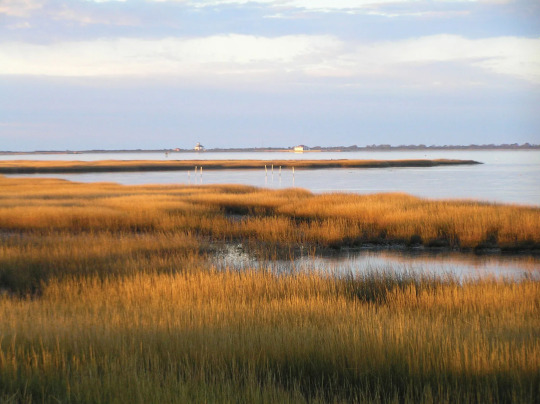
But as border areas. There were two marshes-Welsh Marsh, next to Wales. Ludlow was located in Welsh Marsh-hence technically still within England, and then there was Scottish Marsh in the North.
Ireland had lots of indenpendent territories which didn’t aknowledge Tudor rule at all, and then English Pale, but I’ll do separate post about Ireland itself and explain more in detail there.
Wales was once idenpendent but even before War of Roses fully under the control of English.
Calais is city nowadays in France, but it was English right until reign of Mary I. It was english enclave and important trade connection between island England and continent.
By the way, it wasn’t formerly part of Normandy, it’s bit more up North from that...and was actually captured by English in 1347 and stayed English until 1558, when Mary I lost it to France.
You probably knew all of that. But what the hell is Berwick?!
Well, actually there are several towns called Berwick.
I believe the record is talking about Berwick-upon-Tweed(or on the Tweed).
(Historically it was called by Scottish as South Berwick, because they also had another town called Berwick more North, which they called North Berwick).
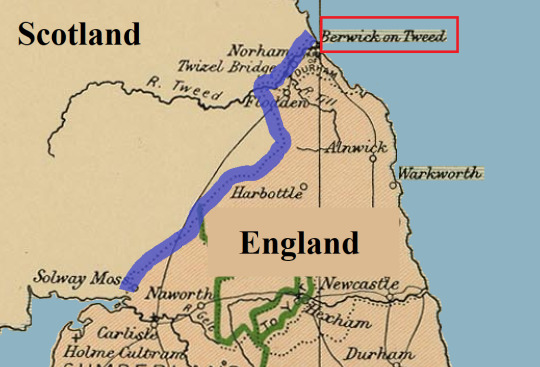
A town on Scottish/English border, over which they fought many times and it changed many hands. But it seems the town had different status than any other town, and in 1551 Berwick was declared to be free town, indipended from either Kingdom. In practise controled by English, but had independed borough, outside of authority of any English county. The wording of sumptuary law in 1510 suggest Berwick had similiar status even long befor this.
(Maybe just not officially.)
It was sort of enclave, like Calais, with special rules.
Interestingly the town was offered by Margaret of Anjou to Scottish in 1461(for their support) and before Richard III proclaimed himself king, in 1482 he recaptured the town from Scottish. Scottish didn’t accept this conquest, in their documents it was still Scottish many years later, but in practise the town remained English ever since. Elizabeth I spent massive funds for fortification of the town. So clearly it was very important.
Until Scottish and English crown united in 1603.
And then there are/were islands. And quite often it is mentioned in records(or on wikipedia) that somebody (nobles) in times of distress(like political situation being unstable) would seeking shelter/refuge upon these islands...
If the island was separated only by narrow strait from mainland, it was much easier to govern, and was offically part of the mainland territory.
For example to the South of Englad we have Isle of Portland(source of Portland marble) and Isle of Wight. They were part of Kingdom of England.
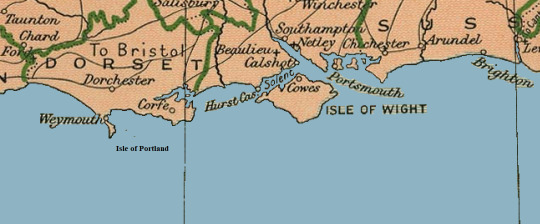
Isle of Wight again:
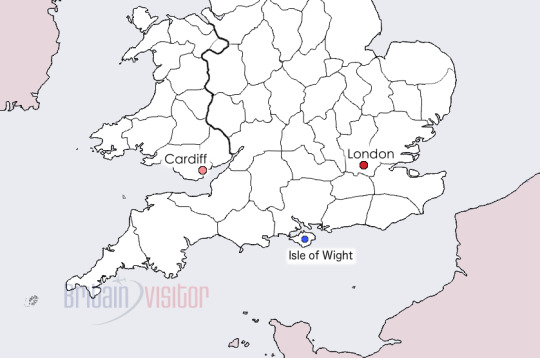
To west of London is Isle of Sheppey:
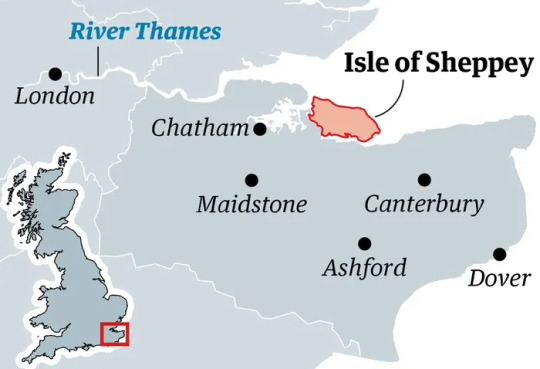
And to N-W of Wales is Anglesey and Holy Isle-which were part of Wales:
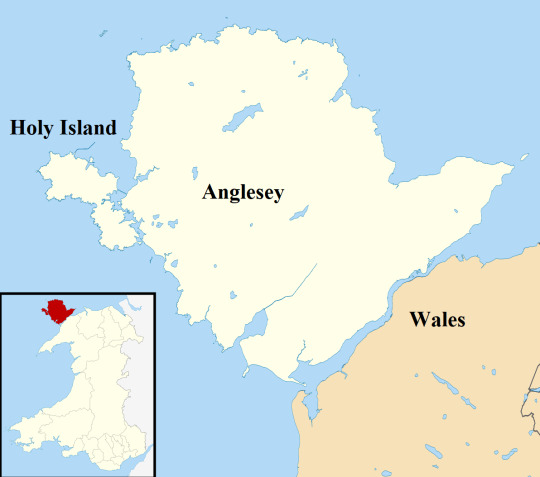
But what if Island is further away?
To West of Cornwall(S-W England) are Isles of Scilly:
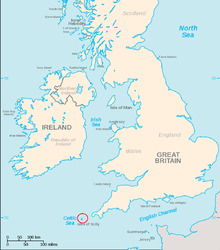
Also called Sorlingas (Spanish, Portuguese) or Sorlingues (French). In the Cornish language, the Isles of Scilly is Syllan.
They are further away, but still under control of English since before 1000, and were part of England.
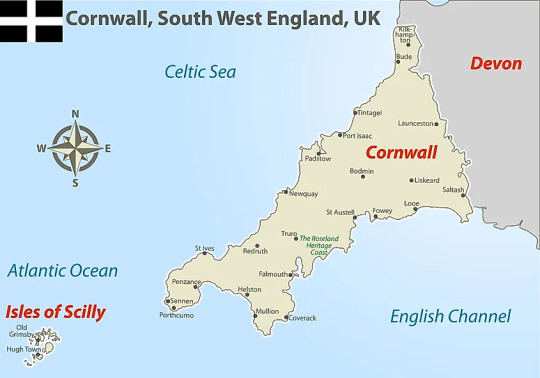
However, there are islands, which never became part of English Kingdom(nor Wales) but were under English Crown. For centuries.
Nowadays they are the dependencies of the British Crown(not to be confused with overseas crown depencies) They are still under same monarch, but have their own goverment, passport etc.
Some of them now claim they had special status since medieval times, it is not confirmed as far as I know.
But due to them being further from England, it is likely they had some level of automy and special governing from before Tudor era. Even if it wasn’t offical. They are simply not close enough to any mainland coast for it to be easy to control them. But probably because it wasn’t official that Sumptuary law didn’t mention them. (It could be just traditional...)
-Isle of Man, which is located in Irish Sea between Ireland, Scotland, Wales and England:
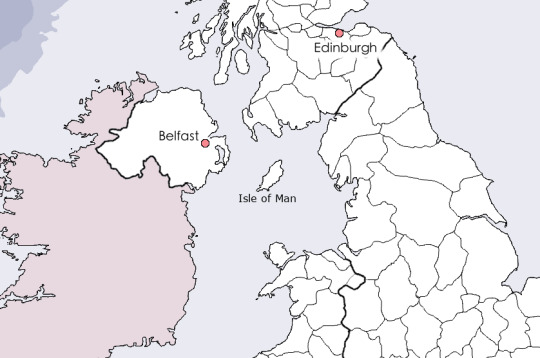
In past it was conquered by vikings, and in 13th century Scottish King bought it from Norway in 1266, but in 1290 English seized it. In 1313 Scottish retook it, and then for rest of 14th century it kept changing hands. But by beginning of 15th century it was in English hands and would be ruled by Stanleys.
-and the bigger of the Channel Islands(not to be confused with Californian Channel Islands).
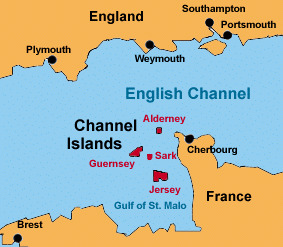
I am talking about islands in English Channel(La Manche, sometimes they are refered to as Norman Islands, and that is pretty accurate.
The channel islands originally belonged to Duchy of Normandy and when English lost the mainsland Normandy and they managed to keep those islands.
-Biggest islands being Guerseney, and Jersey and then smaller Alderney, and many smaller islands:
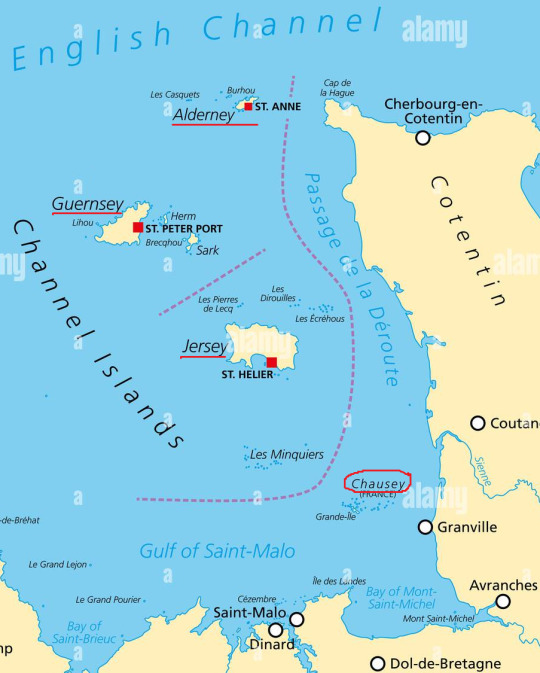
But that is not entire story. Because English kept the bigger ones, which are now considered Channel Islands, but during Tudor times, English abandoned the smaller Chausey islands and eventually French took hold of them.
On wiki you can find that Chausey Islands were administered from Jersey until 1499, when the Jerseymen abandoned it to the French for reasons unknown. The Jersey historian Alec Podger has suggested that it was too costly in terms of money and manpowower.
Addionally I am truly confused in how Channel Islands are described nowadays. Because I literally never came upon word bailiwick before.
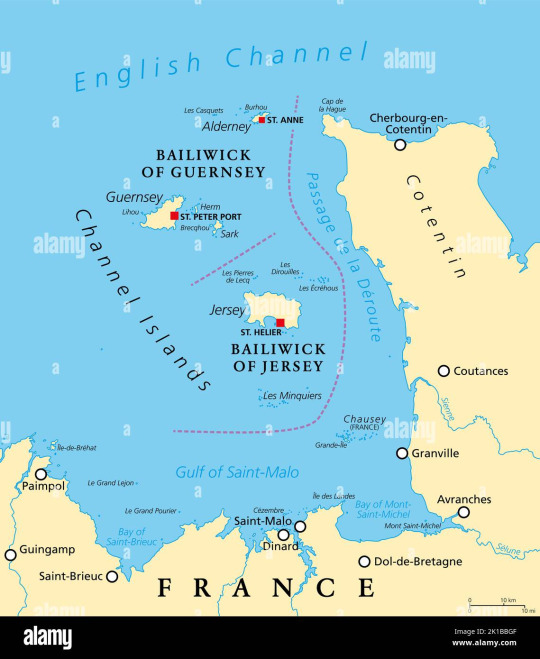
There is Bailiwick of Jersey and Bailiwick of Guernsey. That’s their official name. But what is it? Well, I read the definition several times and I am no wiser.
Best I understand it(and I might be completely wrong) it is Administrative term originating in french language, which sort of groups those islands together under the name of the biggest island. Sort of like town of Buckingham gives name to Buckinghamshire, but with islands.
If somebody understands it better, I am all ears.
Another thing you should know, that English coast nowadays and back then is not same. From Arthurian legends you probably know erosion occured on big scales even back then! (One of Arthur’s knights was prince of Kingdom West of Cornwall which sank under sea.)
But strangely the coast also can grow bigger.
WHAT?! What the heck you mean?’ -you asked.
Allow me to demonstrate-this is reconstruction of Harlech castle(in Wales)-how it used to look:
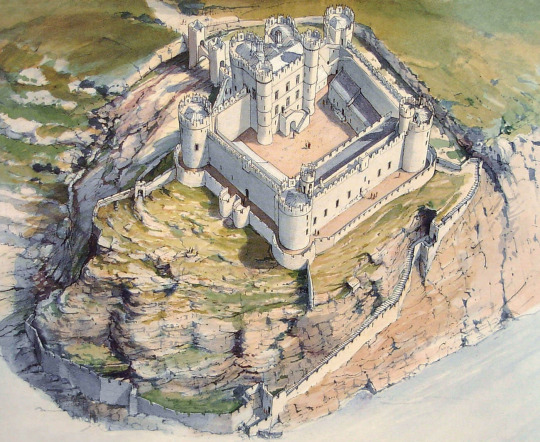
In botton of the picture you can see it had access to the sea, and it could be supplied by ship. Maybe this is better:
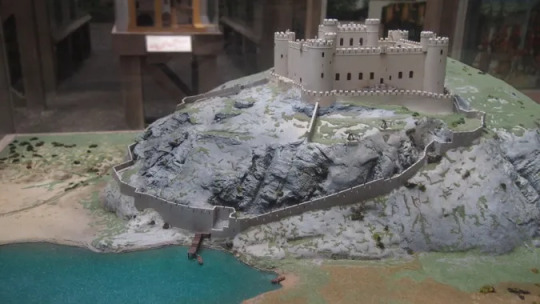
And this is current view from Harlech castle from google maps:
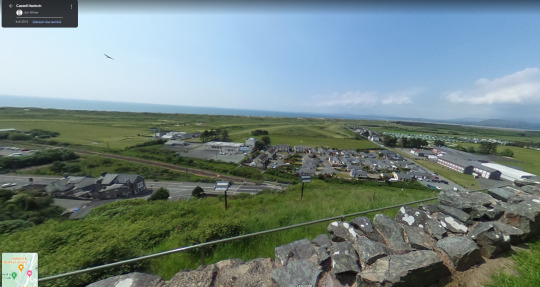
The sea is several km away and there are many buildings in places where once the sea was. Overtime sediments build up in the place, and coast grew!
It’s not the case that west coast grows and East disappears, it’s more complicated than that...But important is, the coast is changing and if you ever time-travelled, be aware.
So I hope you’ve learned something new from this.
5 notes
·
View notes
Text
Threads of Fate Part 8
A little bit from Canute in this chapter. Hope you all enjoy!
Read on AO3 here if you prefer :)
Canute leaned against the pillar, content to mold into the shadows. It had worked—the bridge had fallen, the soldiers trapped, England was theirs. He would never forget the look of defeat on the young king’s face, or the women he saw standing on the battlements.
That morning he had awoken, and went to her tent first thing, only to find it empty. Worry seized his heart, and he went to everyone to seek out where she had gone. No one had an answer. It was then anger replaced worry. He could not accept she had been a spy the whole time, that he had trusted her despite the signs, that he had come to care for her so deeply.
When he had seen her on the battlements, he almost did not believe it. Her cold stare meeting his, and yet something had been concealed behind the look. In the moment, he had been too caught up in carrying out the plan. Now he was intent on finding the truth.
He realized, however, that if she had been spying, she would have told them of the bridge. Considering that he currently stood in the castle the victor, and the evidence of Streona’s men who were posed to attack, they had no clue the bridge would fall.
Which left only one possibility—Emma had not told them. Either she was playing her own games, or something more was amiss.
Canute waited for the young king to be brought in. His thoughts soon interrupted by his entrance.
King Edmund was just a boy, but when asked to meet a Viking King on the bridge, he had done it. If Canute knew one thing, it was the guts it took to meet one’s enemy on the battlefield. Even though impulsive, there was courage in him, and Canute could admire that.
However, he knew this young king was not the mastermind behind these plans, nor was he the reason they had been successful. No, whatever was going on with Emma, she was responsible for that. Yet the boy remained persistent, answering in exactly the way he knew to. So, he would ask the one question that had clawed at him since seeing her face on the enemy’s side.
“Who was the woman on the battlements?”
The boy looked clearly stunned at his question, probably wondering why the new king was so keen to know about his stepmother. “Emma of Normandy”, was all he said.
He would have to find Harald, get him to locate her. The only way he was to solve this was by questioning her himself.
Canute knew Harald was upset with him—he had barely managed to get him off the young king before he killed him—but they had to work together now. When he found him, Harald was with the sick tents. So many had been injured, others he knew were dead. Canute had ordered that anyone seeking treatment would be seen. This included the English.
He pulled Harald to the side, explained he sought the queen.
“Canute, there is something you should know.” Harald indicated a small alcove where they could speak. “Last night, as we entered through the marshes, we saw commotion. Two men riding horses made way to the other side of London. Thankfully we were disguised well enough to not be seen, but we saw them. One of them carried a woman hung over their horse, she looked like Emma.”
“You are certain.” If it was true, had Emma been captured? This was still not enough to explain her presence on the battlements. Her presence as the queen.
“I can’t be certain, but what if she is being held prisoner by Streona?”
Harald had not put two and two together yet. Nor had he been close enough to the queen to figure it out. Regardless, Canute needed him to find her.
He felt his anger rising again but for a different reason. The image of Emma bound, incapacitated, and captive sent retribution through him.
Had the English sent their own queen to be a spy? If so, why had she not given the most crucial detail for the victory of England? He had sensed something was wrong, and now had further evidence to confirm his suspicions.
All of the answers would come to light eventually. Right now, he just needed to find her.
~
Emma sat in a small room overlooking the courtyard. The cool stone of the room mirroring the ice in her heart. She was being held hostage here, but not by Streona. Olaf had found her after the siege, seeing her had confirmed that she was a spy. That was all he needed to know.
Then she had been left in this room until he returned. The iciness in her threatened to become shivers as she looked out the window. She had held up, kept herself in a stony mask of no emotion. It threatened to shatter as she sat and waited.
She reminded herself the only thing that mattered was the plan had worked, Canute had won. It was either Olaf’s wrath or Streona’s anger when he found out she had not mentioned the bridge. Streona, the liar, had posed himself to still attack the Vikings, despite her cooperation. She had watched as he had crested the hill, only to turn back when he saw the bridge fall. He would still hold her to the bargain. To help him claim the throne. Perhaps he was still plotting how he would use her next. She could not let that happen.
The door opened creaking on its hinges. Olaf entered slowly, and Emma was really tired of these men looking at her like she was a hare caught in their trap. She stood, no matter what she would stare them down, she would not succumb to what they wanted of her.
“I hope you are comfortable.” Something in his tone said he really could care less.
“As comfortable as one can be being held captive.”
“Let’s not get too comfortable then, Queen Emma. Or should I call you Lady Ælfgifu? Maybe you are just simply, Emma.”
Emma knew the trap he laid for her. She would not fall for it. The whole situation was a mess, that did not mean she had to create more of one.
He continued. “Does Canute know? Believe me, I never suspected England would send their own queen to infiltrate our forces. What a fool Canute must think himself.”
She tried to keep her icy demeanor in place at the mention of Canute, so she asked him instead, “What do you want, Olaf?”
“I think it would be obvious. I want you to tell me where you and the king have hidden that treasure of yours.”
Now, if Emma had truly been the queen, she would of course not tell him, but she was not the queen. As a woman from another century, she had no clue, obviously. So, when she spoke next, her words were as true as they could be.
“I do not know.” She ushered every ounce of authority she could in that statement.
He stood. “Well, then”—he walked toward the door, and it opened revealing two little boys— “perhaps your memory will return. Until then, your sons stay with me.”
At the look at the two sweet little boys face, her heart did summersaults. They looked no older than five and seven. Both of their parents were dead, that meant they technically were orphans. All they had was her.
“If you think that will get my cooperation, you would be wrong.”
Olaf did not reply to her, “Hopefully next time I come back, you will have an answer.” Then he was gone, taking the little ones to a place she knew not.
Emma would not leave those children alone. Her heart cried for how scarred they must be.
She sat back down, the iciness in her now turned into dread, hopelessness. If she did not give Olaf an answer, she was going to face the consequence. She already was posing as a queen, and the Vikings for sure thought her a traitor now.
Suddenly she did miss home, but she realized it was not a place she missed, but her parents. The ones who had made home feel like home.
She had worked hard in her life, gotten so far, this would be no different. She would find a way out of this.
A knock sounded at the door, causing Emma to startle in the direction of Harald walking though the threshold. A serious look marred his features. “Olaf should be more discreet with his hidden locations.”
She was hesitant to ask but was so confused why he would find her. “Why are you here?”
“The king wishes to see you. By the looks of it, you have some explaining to do.”
Emma did not retort, for at that moment he threw her fur jacket. She barely had time to catch it, but not before getting a mouthful of fur. She rolled her eyes at his rudeness.
Following behind him, she felt her heart lodged somewhere in her chest. She thought back to looking down on Canute from the battlements, tried to make out the expression on his face upon seeing her. At the time, she had seen surprise, or maybe that was what she wanted to see.
The only way she would find out was to face Canute herself.
7 notes
·
View notes
Text
---
Every village in France is under the influence of some protecting saint, modelled according to the characteristics of the inhabitants.
Saint Michael watches over Lower Normandy, Saint Michael, the radiant and victorious angel, the sword-carrier, the hero of Heaven, the victorious, the conqueror of Satan.
But this is how the Lower Normandy peasant, cunning, deceitful and tricky, understands and tells of the struggle between the great saint and the devil.
To escape from the malice of his neighbor, the devil, Saint Michael built himself, in the open ocean, this habitation worthy of an archangel; and only such a saint could build a residence of such magnificence.
But as he still feared the approaches of the wicked one, he surrounded his domains by quicksands, more treacherous even than the sea.
The devil lived in a humble cottage on the hill, but he owned all the salt marshes, the rich lands where grow the finest crops, the wooded valleys and all the fertile hills of the country, while the saint ruled only over the sands. Therefore Satan was rich, whereas Saint Michael was as poor as a church mouse.
After a few years of fasting the saint grew tired of this state of affairs and began to think of some compromise with the devil, but the matter was by no means easy, as Satan kept a good hold on his crops.
He thought the thing over for about six months; then one morning he walked across to the shore. The demon was eating his soup in front of his door when he saw the saint. He immediately rushed toward him, kissed the hem of his sleeve, invited him in and offered him refreshments.
Saint Michael drank a bowl of milk and then began: “I have come here to propose to you a good bargain.”
The devil, candid and trustful, answered: “That will suit me.”
“Here it is. Give me all your lands.”
Satan, growing alarmed, wished to speak “But—”
The saint continued: “Listen first. Give me all your lands. I will take care of all the work, the ploughing, the sowing, the fertilizing, everything, and we will share the crops equally. How does that suit you?”
The devil, who was naturally lazy, accepted. He only demanded in addition a few of those delicious gray mullet which are caught around the solitary mount. Saint Michael promised the fish.
They grasped hands and spat on the ground to show that it was a bargain, and the saint continued: “See here, so that you will have nothing to complain of, choose that part of the crops which you prefer: the part that grows above ground or the part that stays in the ground.” Satan cried out: “I will take all that will be above ground.”
“It's a bargain!” said the saint. And he went away.
Six months later, all over the immense domain of the devil, one could see nothing but carrots, turnips, onions, salsify, all the plants whose juicy roots are good and savory and whose useless leaves are good for nothing but for feeding animals.
Satan wished to break the contract, calling Saint Michael a swindler.
But the saint, who had developed quite a taste for agriculture, went back to see the devil and said:
“Really, I hadn't thought of that at all; it was just an accident, no fault of mine. And to make things fair with you, this year I'll let you take everything that is under the ground.”
“Very well,” answered Satan.
The following spring all the evil spirit's lands were covered with golden wheat, oats as big as beans, flax, magnificent colza, red clover, peas, cabbage, artichokes, everything that develops into grains or fruit in the sunlight.
Once more Satan received nothing, and this time he completely lost his temper. He took back his fields and remained deaf to all the fresh propositions of his neighbor.
A whole year rolled by. From the top of his lonely manor Saint Michael looked at the distant and fertile lands and watched the devil direct the work, take in his crops and thresh the wheat. And he grew angry, exasperated at his powerlessness.
As he was no longer able to deceive Satan, he decided to wreak vengeance on him, and he went out to invite him to dinner for the following Monday.
“You have been very unfortunate in your dealings with me,” he said; “I know it, but I don't want any ill feeling between us, and I expect you to dine with me. I'll give you some good things to eat.”
Satan, who was as greedy as he was lazy, accepted eagerly. On the day appointed he donned his finest clothes and set out for the castle.
Saint Michael sat him down to a magnificent meal. First there was a 'vol-au-vent', full of cocks' crests and kidneys, with meat-balls, then two big gray mullet with cream sauce, a turkey stuffed with chestnuts soaked in wine, some salt-marsh lamb as tender as cake, vegetables which melted in the mouth and nice hot pancake which was brought on smoking and spreading a delicious odor of butter.
They drank new, sweet, sparkling cider and heady red wine, and after each course they whetted their appetites with some old apple brandy.
The devil drank and ate to his heart's content; in fact he took so much that he was very uncomfortable, and began to retch.
Then Saint Michael arose in anger and cried in a voice like thunder: “What! before me, rascal! You dare—before me—”
Satan, terrified, ran away, and the saint, seizing a stick, pursued him. They ran through the halls, turning round the pillars, running up the staircases, galloping along the cornices, jumping from gargoyle to gargoyle. The poor devil, who was woefully ill, was running about madly and trying hard to escape. At last he found himself at the top of the last terrace, right at the top, from which could be seen the immense bay, with its distant towns, sands and pastures. He could no longer escape, and the saint came up behind him and gave him a furious kick, which shot him through space like a cannonball.
He shot through the air like a javelin and fell heavily before the town of Mortain. His horns and claws stuck deep into the rock, which keeps through eternity the traces of this fall of Satan.
He stood up again, limping, crippled until the end of time, and as he looked at this fatal castle in the distance, standing out against the setting sun, he understood well that he would always be vanquished in this unequal struggle, and he went away limping, heading for distant countries, leaving to his enemy his fields, his hills, his valleys and his marshes.
And this is how Saint Michael, the patron saint of Normandy, vanquished the devil.
Another people would have dreamed of this battle in an entirely different manner.
#long post#Rjalker reads The Complete Original Short Stories of Guy de Maupassant#the devil#Satan#st. michael
0 notes
Text

https://linktr.ee/nichproductions Pennington Keyhaven & Normandy Marshes 1G - C.06.05.2022 https://www.flickr.com/photos/9095732@N05/53119449407/?utm_source=dlvr.it&utm_medium=tumblr https://linktr.ee/nichproductions
0 notes
Text
Visiting Beaches in Paris
How to find beaches in Paris
Paris has many sandy beaches, including Vendee, which has over a 100 miles of dunes with backgrounds of pine. The climate is usually mild, which allows you to enjoy surfing, diving, swimming and so on. On the south end of the beach is the nude area. Throughout the beach are marshes that spark attention of birds. You also have a batch of lakes and rivers to cast your fishing rod. Throughout the area, you will enjoy wildlife at its best. Along the shores are scores of walkways that take you through some of Paris’s finest environments. You also have museums nearby as well as abbey, places of worship and more.
Paris’s Cap Ferret is a nice beach where you will enjoy boating adventures. At the beach, you will enjoy swimming, surfing, fishing, diving and quietness. Around the area are nice campgrounds and fabulous hotels. Along this area is Frances popular coastline that stretches to the La Marenda and surrounds villages around Pyrées-Orientales, which is the location of département around Paris.
Paris also has nice beaches at the Pegasus Bridge and along through Benouville and Normandy. Around the beach, you can enjoy tasty pastries at the Café Gondree and then move onto the coastlines of Landing Beach. Harbors around this area were built in a few days, which the structures are artificially patterned along Gold and Juno. At the front area of the sea is one of Paris’s fine restaurants where many tourists enjoy a hardy meal. Pointe du Hoc is one of the main attractions along this beach. St. Laurent Cemetery is another of the main attractions. Omaha Landing is the beach areas where you can enjoy fine dining as well.
How to find deals:
If you want to visit Normandy area go online to find great deals. Packages are available, which you can visit the area for under $200.
Crozet Islands is another area you may want to visit in France. This South Territories is in France district, yet it stretches to the Indian Ocean grouping around smaller islands. The islands make up the Big/Little Islands, which are France’s major inlets. Around the area are rock foundations and uninhibited regions. You may want to visit this area, but I am not sure you want to swim in the waters, at least not in deep waters. According to the history, this region has been noted fro preys, such as the Killer Whales. A nice selection of seals swims these waters also. The waters have a history of shipwrecks also. In fact, so many wrecks and disappearances occurred in these waters that the military took action.
Paris is surrounded about many areas where the Mediterranean Sea spreads over the Black Sea, Arctic Ocean, Atlantic Ocean, Caspian Sea, and so on. Much of Paris’s water however streams from the Seine River and the Atlantic Ocean. Around the Seine River, you will find waterways, ponds, lakes and more. At some areas, you can enjoy fishing, diving, swimming, boating, water skiing, and so forth. Downstream of the Seine River is where you will find Normandy Beach.
The Seine River has areas where you can enjoy rides on riverboats, traveling calm waters where the boats will navigate easily through the streams. Make sure that you look along the shores where you will enjoy many brilliantly lit buildings around Paris.
When visiting Paris be sure to check out the history of the Seine River to see where it leads you. The history has an amazing punch line that takes you back to the massacre in Paris.
0 notes
Text
gonna tell my kids they were the Normandy crew from Mass Effect

#mass effect#me#me2#me3#normandy crew#south park#stan marsh#michael sp#Yao sp#Mercedes sp#dancing duck
15 notes
·
View notes
Text




Young Goldfinch out the back and trees in the bright sunlight against dark clouds which has been great to see tonight 30/05/2024 and Marsh Fritillary at Magdalen Hill last Thursday and Little Tern at Normandy Marsh, Lymington on Sunday.
Mallard, Jackdaw, Carrion Crow, Robin, Grey Wagtail, Blackbird, Blackcap heard, privet flowers, pineappleweed, white clover, ivy-leaved toadflax and gorgeous Love-in-a-Mist flowers in Dean Garnier Garden were other highlights today.
#marsh fritillary#goldfinch#little tern#trees#sun#may#spring#photography#outdoors#birdwatching#yellow#orange#green#magdalen hill#eastleigh#winchester#lymington#europe
6 notes
·
View notes
Note
If you're still taking prompts for Emma/Canute (and no worries if you're not), then the prompt I have is: jewelry
The Norwegians depart on the morning tide, and with them half his forces, but Canute is not entirely sorry to see them go. They are more unruly and less bound by loyalty than his own Danes; given half a chance they would continue to plunder the kingdom for their own spoil, regardless of his plans for it. He climbs to the battlements and watches the boats slip into the river, the oarsmen pushing them steadily out to sea.
With them gone, he can breathe a little easier—and begin to take stock of the country he has acquired.
He turns away from the river and towards the city, casting an eye over the thatched tops of houses, spired church towers, the half-ring of wall and the hinterland beyond. London is the largest city he has ever seen, plump and prosperous with the wealth of merchants and craftsmen. It is not made of gold, but it might as well be for all the possibility it now holds for him.
In the courtyard below, he spies a familiar figure making its way through the scrum of men and animals. She is no longer dressed in black, but brilliant red—yet he suspects he would recognize her no matter the color.
The queen looks up, noting his position on the parapet, and then makes a direct and deliberate line towards the wooden staircase that will bring her to him.
Canute waits, a part of him taking some pleasure in being found by her.
He says nothing as she approaches, but lets her take the lead. That does not stop him from glancing at her, though, from admiring the richness of her gown and the way it’s cut to accentuate the curve of her waist, the dark tresses of her hair, the rubies big as robin’s eggs dangling from her ears.
The jewelry, he assumes, is a conscious choice. It is meant to decorate, but also disarm, for while the rubies speak of wealth and opulence, the diadem atop her head declares her continued claim to power, still a queen in spite of his conquest. She is not here to play the vanquished suppliant—nor, he realizes, would he want her to.
For a moment they simply stand there, side by side, until she turns to face him. “I’ve come to offer my thanks for the return of my sons,” she tells him, without a hint of coquetry, “and to ask what I can do to repay your kindness.”
He nods. It is understandable that she would think herself now in his debt and want to find some way to even the balance sheet. Despite the assistance he rendered her in finding her children, he is still a conqueror, a stranger. Canute has thought about how he wants to solicit her advice in the running of this country, and he realizes that he must allow her to agree freely, without thinking that she owes him something. He must open the door for her—and then wait to see what she chooses.
“I accept your thanks, but you are under no obligation to me. In fact,” he says, “you are free to go at any time.”
Her eyes narrow slightly in confusion. “Free to go? Where?”
He turns to face the river, jutting his chin towards what lies beyond it: the marshes, the sea, the wide inlets and rocky shorelines of her birthplace.
“Normandy, if you wish.” And then, if only to drive in his point more mercilessly: “Home.”
It is difficult to walk away from her, but he knows he must. In a way, he is playing a part—much like he did with Edmund, when he goaded him onto the bridge—but it is necessary in order to know what she truly wants, as opposed to what she might do out of duty or fear. He is more than gratified, then, to hear the sound of her footsteps as they follow him down the stairs.
“King Canute...”
He turns back, watching as she steps onto the landing, the scarlet of her gown serving as a dazzling contrast to the drabness of wood and stone. He had admired her beauty before, but now she is simply breathtaking. It is because she is no longer afraid, he realizes.
“I came to England when I was a girl,” she tells him. “This is my home now, and where I wish to remain.”
Canute tries to keep his expression neutral as he walks back towards her—one of the abilities he has mastered in his years as a ruler of men—then stops and leans against the wooden railing. He is enjoying the reversal of looking up at her, the hint of a smile beginning to form along the corners of his mouth. Now, at last, he can be honest, which will be far easier than feigning indifference.
“I am pleased to hear that.”
“You are?” she asks. “Why?”
Her curiosity—and directness—is refreshing. It is rare to find anyone, much less a woman, who speaks so plainly, without any need for games or subterfuge. He wonders if Æthelred knew what he had in her—clearly the boy king did not—and he promises himself he will never take her counsel for granted. If, of course, she will agree to give it.
“Because I would like you to be my... advisor.”
It is impossible to miss the warm flush in her cheek, the quirk of her lips. “An advisor? And on what subject would I advise you?”
Everything, he wants to say. Canute has only just met her, but he can already sense the depths of her mind, the way she sees the world not as she wants it to be, but as it is, and as it could be, if the proper thought and preparation were brought to bear upon it. If he could, he would make her his right hand, the commander of his army and his fleet, he would set her atop his kingdom and watch as she coaxed it into well-ordered submission. But he cannot tell her this; perhaps he is not blessed as she in being direct. Instead, he will offer her something smaller, but that still has the benefit of being true.
“I am an outsider,” he says, “as you once were. Half my army sailed away this morning, which makes me vulnerable here. You convinced the Saxons to accept you. Now I need them to accept me.”
Her gaze narrows, if only slightly. “What do you want from England?”
It is an excellent question, one that Canute had not expected her to arrive at quite so quickly. But perhaps he should have anticipated nothing less.
She is deserving of an answer—an honest one.
As if of its own volition his hand reaches out toward her, palm open in silent invitation. He had asked for her hand before, that night in the hall, and she had given it, a small, warm thing clasped in his. This feels different, though, for there is no one to see, no elaborate courtesies to be made, only the forging of a partnership—and perhaps, he senses, the possibility of something more.
Her deep blue eyes are trained entirely on him as he helps her down the last few steps of the staircase.
“I wish to build a great northern empire that stretches across the top of Europe.”
He has told almost no one about the full reach of his plan; even with her, the number can be counted on less than one hand. It is his great ambition, his life’s achievement, and now with England in his grasp he is that much closer to fulfilling it. But the question remains: will she help him or will she set herself at odds against it?
As he finishes speaking, Canute watches her, gauging her reaction. He can almost see her thoughts move behind her eyes, a tiny, satisfied expression beginning to form on her lips.
“You need England’s wealth.”
He almost laughs; she has concluded in seconds what it would have taken Olaf or Harald hours, if not days, to understand. Canute will have her as his advisor, or he will have no one else.
“Yes,” he tells her, surprisingly pleased at having been figured out so easily.
Still, she has not yet given him an answer. All this time she has been thinking, he realizes, asking questions of him to give herself more time to consider his proposal.
“Will you aid me in this effort, Queen Emma?” he finally asks. “As I said, you are under no obligation. In fact, your loyalties may lie elsewhere.” He pauses, jutting his head in the direction of the city, and the palace doors. “But I would have you at my side, if you so choose.”
He can tell she is flattered, but she still appraises him with a cautious eye. As she stands there, the mid-morning light grazes the side of her face, glinting bright across the facets of the ruby dangling from her ear. She is a spoil of war, but perhaps she is the victor, too—both prize and conqueror to whatever man lucky enough to stumble across her path.
Canute waits for her answer, his heart beginning to turn like a ship in a wave-tossed sea.
[send me a one-word Emma/Canute prompt]
#vikings: valhalla#vikings valhalla#king canute#emma of normandy#canute x emma#vikings netflix#fanfiction#one word prompts#the-undoubted-queen
24 notes
·
View notes
Note
Can I get you to infodump about the danelaw because I literally only know about it from crusader kings 3 and much as I love paradox idk how well history gets distilled into a management game
Kthx have a good day
this took me so long to get to APOLOGIES
i've kind of cherry-picked important and interesting bits without writing a whole book or something so here goes lol
first off its important to note that the Danelaw in and of itself was a VERY brief spit of time which was also constantly in flux !! it lasted less than 100 years sandwiched between the start of the Norse invasions and the ousting of a king (and his death), then it was only another 100 years until the Norman invasion, it was a Wild time
ALSO i'll mention too that the term "Danelaw" was probably not a contemporary term. It's first recorded mention as Dena lage in the 11th century, over 50 years after what's now considered the Danelaw had dissolved. It's a term used to distinguish the self-governed Norse-held areas of Britain from those under West Saxon or Mercian law, literally The Danish Law and wasn't used to describe the geographic area until a little later.
It's also worth mentioning that while certain parts of the Danelaw were maintained as kingdoms or client kingdoms of some form (namely the Kingdoms of York and East Anglia), a whole lot of what was part of Mercia or Essex was left to its own devices under Jarldoms of the larger towns (boroughs/burhs). What was called The Five Boroughs of the Danelaw were a very important area in their own right, constituting a strong alliance between the Jarldoms of Derby, Leicester, Lincoln, Nottingham and Stamford. The area south of there was also under various Jarldoms (like Cambridge and Northampton) but they weren't as influential or closely knit as the Five. Technically speaking, the Danelaw is considered a Confederacy under the Kingdom of Denmark, but even aside from the existing peoples, the Norse people living there weren't all from Denmark by any stretch. After it's reunification under Alfred, the whole of England did become part of the Kingdom of Norway for a while under Cnut the Great, before his death split the various territories again, though England was still under Scandinavian influence of some degree all the way up to the Norman Conquest.
one of the more interesting things about the whole affair is that the culture and languages of the Scandinavian Norse and Anglo-Saxons were actually very similar as they had come from the same core groups of people not too long before. the speech was mutually intelligible at a basic level, both parties used a form of the Younger Futhark in some part, a lot of cultural concepts were the same. Aside from the Norse being an outside force, the only big difference was religion. The Saxon kingdoms had been entirely Christian for at least 100 years, despite the Saxons themselves being an interrupting force in the spread of Christianity through Britain even from during late Roman occupation.
Probably the EASIEST thing that made it all compatible other than the language was the similarity between the legal systems of the territories. For example the concept of compensatory damages existed in both places (weregild, literally man-gold), the Norse land division wapentake was more or less interchangeable with the Anglo-Saxon hundred, and so on. A lot of vague traditions held by Saxon peoples were continued in their own fashion, and other than the obvious upheavals of new rulers and raiding parties, not much else actually changed. The descendants of the united Scandinavian armies also made it a relatively peaceful area considering the remaining Anglo-Saxon kingdoms regarded them as squatters, but their closer shared culture and remaining unity actually made it pretty easy for the loose alliances of the Danelaw to stand up to the Anglo-Saxon pushback until it was mostly just Wessex left, with King Alfred in hiding somewhere in the Somerset marshes.
It's really quite astounding Alfred bounced back to unify England at all after that on the face of it.
the geographic spread is also an interesting thing ! the first recorded Viking raid is in 793 at Lindisfarne monastery off the coast of modern Northumberland (VERY north) but the first recorded wintering of Norse peoples intending to stay long-term was actually in East Anglia (VERY south). What the Anglo-Saxon Chronicles called "The Great Heathen Army" marched the length of England to go and take advantage of a civil war happening back in Northumbria, where they captured and sacked York (Angle: Eoforwic, Norse: Jórvík) in 865.
This established the START of the Danelaw as its usually measured, which spanned from 865 to 954.
It actually took only 10 years from the sacking of York for most of the Danelaw to become the Danelaw as most of its maps depict at its maximum, and for Alfred of Wessex to make peace with yet another settled Norse group in Dorset. Also! its worth noting that Alfred only became the king of Wessex after his brother Æthelred died in 871, well after the Dane forces had already taken hold of the Kingdom of York, the Kingdom of East Anglia, and a significant chunk of Mercia.
He was of course already involved in the affairs but he did get chucked in at the deep end lol
Part of the peace keeping the re-established Kingdom of Wessex under Alfred and the Danelaw at large under fairly steady and peaceful borders for its more stable periods (definitely a relative term) from 878 , was down to Guthram and Alfred's agreements. After Alfred came out of his hiding in exile with an army, and forced the Danes to surrender, Guthram agreed to be baptised with Alfred as his godfather, and also agreed to go back to his Kingdom in East Anglia. In 884 Guthram made a run of it again and attempted to take Kent, but in being unsuccessful he signed the Treaty of Alfred and Guthrum, which basically established the formal border of the Danelaw and let them self-rule if they did keep to themselves. It wasn't until 902 that shenanigans started happening again, but considering how generally tumultuous the entire period was, just shy of 20 years of formalised peace wasn't bad going.
Eiríkr Haraldsson (or Eric Bloodaxe) was a pretty obscure guy for a lot of his life considering he was definitely Norwegian nobility. It's thought he may have been King of Norway for a short time, and maybe Northumbria twice over - though definitely for the second time when he was ousted from Northumbria - which essentially brought the end of the Danelaw proper. He's mentioned in a LOT of texts (Egils / Orkney / Icelandic / Norwegian sagas, Anglo-Saxon Chronicle. potentially Historia Norwegiæ, Annals of the Four Masters, Annals of Clonmacnoise), but he's still a bit of a vague figure somehow. He's noted as being a son of Harald, and the Icelandic and Norwegian version of events is that he was one of Harald Fairhair's many sons, although some people think he may have been the son of Harald Bluetooth. He DID definitely exist though, the last Norse minted coins in York are stamped with his name. Norse Northumbria and York was very strongly tied to the Norse Kingdom of Dublin (which lasted a LONG time by comparison), but upon his being removed in 954 the hope of the lands becoming a two-part kingdom fell apart.
The end of the Viking Era itself is often cited as being the defeat of King Harald (Hardrada) Sigurdsson of Norway at the Battle of Stamford Bridge in 1066. He had landed hoping to retake York and the English crown as a whole with the help of King Harald Godwinson's brother Tostig, but the English forces managed to stop them. This actually probably helped out William the Conqueror (also of Norse decendant, Norseman - Norman) efforts less than a month later to take England, since the English armies had already dealt with the same thing and were mostly in the north away from the attacking forces from Normandy. Under William's Norman rule there were a few more attempts by other Scandinavian rulers to retake or at least plunder York, but the efforts never went very far. The last serious raids on England from Scandinavia came from Eystein II of Norway, who took advantage of The Anarchy (a civil war in Norman territories over a succession crisis between 1135 and 1153) to plunder the East Coast.
OKAY i'll stop waffling now but here we go jfkddfjdk
i hope this was interesting enough and something like what you were after instead of just some word puke gjfkdkjfd !!!
18 notes
·
View notes
Text
As Far As Friends Go
This was kind of a transition chapter so cred’s to the show for the dialogue I used. But buckle up, shits really gonna go down next chapter.
Chapter 14 (Chapter 1; Chapter 2; Chapter 3; Chapter 4; Chapter 5; Chapter 6; Chapter 7; Chapter 8; Chapter 9; Chapter 10; Chapter 11; Chapter 12; Chapter 13)
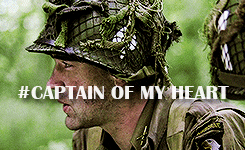
Nixon - June 1944
The drop into Normandy was perilous. Just as Nixon had feared, nothing seemed to go as planned. It was as if the Germans were waiting for them to arrive based off of how much fire they experienced. Nixon, like most of the men, missed his drop zone but he was lucky enough to quickly link up with Battalion headquarters. It was a chaotic couple of first days in France as the airborne got situated in relation to the troops on the beach. Early into their arrival, Winters and the available Easy Company men took down some German guns. This not only saved a number of lives on the beaches but produced a map detailing German artillery positions. Looking at it, Nixon realized how important it could be. It couldn’t wait, so he decided to run to Utah beach to hand the map over to the higher ups who could do something with it. The run to Utah was only three miles, no worse than he had experienced during training. He was grateful though that Command decided to send the first two tanks that landed in to aid the 101st, thus providing Nixon with a ride.
He greeted Winters with a cheeky smile when he returned to the assembly area. “Going my way?”
Winters tossed his gun up for Nixon to catch, “sure.”
The men bunkered down for the night, scrounging for what food and beds they could find. The Battalion was on the move by June 8th on their way to take Carentan. As according to plan, the 101st forced passage into Carentan on June 10th and 11th. The days were hot and muggy, barely cooling down at night for the men dressed in heavy uniforms and equipment. Bugs were everywhere and exhaustion was setting in. Finally, they encountered the Germans. On June 12th the German’s were forced to withdraw and it seemed like victory was theirs. But Nixon was suspicious. Surely the Germans wouldn’t give up such an important position so easily; and he was right. On June 13th the 17th SS PzG Division counter-attacked. Thankfully, the U.S. 2nd Armored Division came in for support.
When Nixon returned to Battalion headquarters with news of their victory he found that Emily had finally arrived.
“Emily!” he wanted nothing more than to hug her in that moment. The last week had been exhausting. It was such a comfort to see her.
“Miss me?” she grinned up at him. Her smile was like a shot of morphine, he immediately felt his muscles relax. “You look a mess,” she shook her head.
“I’m sorry to disappoint you, we’ve only been taking Carentan.”
“Congratulations,” she said, “did you like the tanks I sent you?”
Nixon looked at her flabbergasted. Then slowly, through the haze of his fatigue, he realized she was messing with him. “Ha ha. It would’ve been impressive if you had.”
“Yeah I wish, unfortunately I’m not that powerful yet.”
Nixon slung his arm around her neck, “no but I bet you know where to find me some food.”
Despite his exhaustion, Nixon didn’t sleep well those final weeks in Normandy. Instead, his alcohol intake increased. He had to re-fill his flask every day, sometimes topping it off throughout the day. He would need to replenish his stores soon. But no one anticipated how long they would actually be fighting in Normandy. In fact, the 101st had expected to be relieved much sooner. Strayer kept asking for patrols as the allies attempted to inch their way closer and closer to Germany.
Twenty-five days after D-Day Nixon was sent out on a patrol with Harry Welsh. It was a reconnaissance mission so Nixon was required to go. What they were looking for he wasn’t sure. The regiment had exhausted their knowledge of the German’s position in the area so any new piece of information could serve as an advantage.
Nixon peered through a pair of binoculars from where he and Welsh sat in the brush approximately 100 yards from a run down building. “We need to know what’s in there,” Nixon said.
“I don’t know who the hell to send,” Welsh said.
“Ask for volunteers.”
“I hate asking for volunteers.”
Nixon gave Welsh a pointed look, “then pick them.”
Blithe, Martin, and Dukeman moved in towards the abandoned manor. The rest of the paratroopers sat hidden in the grass behind Nixon. As they waited for Blithe and the others to get into position Nixon spotted something poking out of Welsh’s backpack.
“Harry, what exactly are you doing with your reserve chute? You been hauling that thing around since we jumped?”
Welsh sucked his teeth, slightly embarrassed he said, “gonna send it to Kitty when we get back to England. Silk, figure it’ll make a good wedding dress, ya know, what with the rationing and all.”
Nixon broke view of where the trio was moving in towards the manor to laugh at Welsh, “jeez Harry, I never would’ve guessed.”
“What? That I’m so sentimental?”
“No, that you think we’re going to make it back to England.” Nixon peered through his binoculars again. His mind flashed to Emily as he watched the men crouch down behind an upturned cart. Bad news, he thought. He had suspected for a while now that Emily may have feelings for Welsh, a man who clearly was intending on marrying his betrothed. No matter how much he flirted, Welsh wouldn’t have bothered lugging that extra chute around if he wasn’t serious about Kitty. Bad news for Emily. Suddenly, a shot rang out.
“Covering fire! Covering fire!” Welsh shouted. Martin and Dukeman pulled a downed Blithe back behind the line. They passed Nixon who saw the blood gushing from the young man’s throat before Doc Roe got to him.
“Cease fire! Cease fire!” Welsh commanded.
Winters moved up from behind, “what happened?”
“Sniper,” Nixon said coming up to him.
Winters couldn’t take his eyes off the bleeding Blithe, “they’re pulling us off the front line.”
“Now?” Nixon demanded.
Winters turned to him, “to a field camp north of Utah beach. Hot food, and showers.”
With a last mournful look at Blithe, Nixon turned away to head back. Great fucking timing, he raged to himself.
Emily was at the camp surrounded by intelligence staff and nurses, who were busy at work tending the masses of wounded men.
“Nix?” her voice was gentle when he entered the intelligence tent.
“Couldn’t have let us know a little bit sooner? Sent the runner just a few minutes earlier?” he demanded.
“What are you talking about?”
“We were on a patrol and some kid is probably gonna lose his life because that information came a few minutes too late! I sent them in there, I told them to check it out but turns out we didn’t need to!” Nixon pounded his fist on one of the tables.
“Lewis I didn’t know, that information didn’t come from me.”
“You’re intelligence staff! You’re meant to know!”
“I’m not intelligence staff like you are! I’m no S-2,” Emily shouted back, “no one tells me anything!”
Nixon paced the room trying to calm down, “okay, okay,” he leveled his hands on the desk, “I’m sorry. I just -,”
“It’s fine, I’m sorry too,” Emily stood across the table from him, looking small in the dim light of the tent. “I do know one thing,” she said. He looked up, waiting for her to continue, “we’re going back to England.”
“Right, great.” And he stormed out of the tent onto the beach.
His insomnia didn’t improve even knowing that they were going back to a relatively safe zone. It was impossible to sleep with the sounds of men crying out all around and bodies held together by gauze and tape only paces away. Naturally, the night before they were meant to leave, Nixon couldn’t sleep. He grabbed his flask and made his way towards the dunes on the far side of the camp.
He plopped down on a ridge into a bed of marsh grass, the coarse tendrils tickling his wrists and neck. Nixon closed his eyes and inhaled. The whiskey he had guzzled earlier that night had seeped pleasingly through his veins. The summer air blew across the salty water cooling the sweat where it pooled around his collarbone and lower back. It was so peaceful. If it weren’t for the peppering of tents barely visible against the night sky, Nixon could have pretended he was there on holiday and not for a war.
When he opened his eyes, he saw a lean figure making its way up the dune towards him. Nixon braced himself for the quiet wisdom of Winters. However, the figure failed to grow as it approached him, only reaching a height of about 5′5″. The silhouette revealed itself to be Emily, dressed in another pair of slightly oversized O.D.s.
“What?” Nixon barked at her.
“I saw you pass by,” Emily dropped down beside him, bumping his arm on her way down. Disgruntled, Nixon scooted over slightly.
“Why aren’t you asleep?”
“Why aren’t you?” Emily retorted.
“Couldn’t.”
“Same here.”
Quiet fell between them, a comfortable quiet but Nixon could sense Emily wanted to say more. Finally, her lips parted and she said, “it’s not something you can get over.”
“What?”
“Seeing the men like that.” Emily searched his face in the dark for any reaction. Nixon stared straight ahead. “It’s disturbing and not something anyone should ever have to witness.”
Nixon licked his lips to speak, but all that came out was, “yeah.”
Emily paused, then reached for his flask. She pulled it from his grasp and took a swig, “It’s over for now. We have to find comfort in that.”
“Right, some comfort in that,” he took the flask back for another drink. They sat there side by side listening to the waves crash against the shoreline. As the night waned on, Emily began to doze off. Her head fell to rest on his shoulder. Nixon considered waking her to walk her back to her tent but then decided against it. He didn’t want to disturb her. If she woke up now who knew if she would be able to fall asleep again. Besides, he enjoyed sharing a little sliver of the world with her in that moment. A sliver that was simple and not perverted by violence.
When the sun rose, she stirred and they both made their way back to their tents for a desperate last few hours of sleep before they were to ship off. As Nixon was boarding the ship he saw Emily standing on the Mulberry harbor hugging a dark, thin woman dressed in a nurses uniform. The woman brushed wild hairs away from Emily’s forehead then pressed something into her hand. Nixon couldn’t help but wonder what that exchange had been about. Out of curiosity, he met Emily at the gangway.
“Who was that?” he asked.
“Hm?” Emily pulled a paper wrapped candy out of her pocket.
“Who was that woman you were talking to? A nurse?”
“Oh yeah, that’s my friend Marwa.”
“I didn’t know you had female friends.”
Emily rolled her eyes and popped the candy into her mouth.
“What was that?” Nixon pointed to her mouth.
“Ginger candy, you want one?” Emily offered him a candy and Nixon accepted, beginning to feel like his old self again standing next to her.
#band of brothers#fanfiction#original character#as far as friends go#lewis nixon x oc#emily rooney#lewis nixon#harry welsh#dick winters#female cartographers#females in ww2
15 notes
·
View notes
Note
The Great Gatsby .. I think antibucci Summary: Literally just the great Gatsby. Nothing else here. Absolutely no changes. Definitely use this for class, or reference. The Great Gatsby is public domain now after all. Anyways here's the totally unaltered and complete book of the Great Gatsby. I swear nothing was changed, most definitely. Of course credit to F Scott Fitzgerald for writing this commentary on both his life and the world he was in. A lot of this can still relate today, so keep an open mind when reading. Notes: I'd like to preface this by saying... This is really I mean REALLY just the Great Gatsby. I swear. There is nothing going here that is out of the ordinary! Nothing at all! Chapter 1 Chapter Text Then wear the gold hat, if that will move her; If you can bounce high, bounce for her too, Till she cry “Lover, gold-hatted, high-bouncing lover, I must have you!” - Thomas Parke D'Invilliers. In my younger and more vulnerable years my father gave me some advice that I’ve been turning over in my mind ever since. “Whenever you feel like criticizing any one,” he told me, “just remember that all the people in this world haven’t had the advantages that you’ve had.” He didn’t say any more, but we’ve always been unusually communicative in a reserved way, and I understood that he meant a great deal more than that. In consequence, I’m inclined to reserve all judgments, a habit that has opened up many curious natures to me and also made me the victim of not a few veteran bores. The abnormal mind is quick to detect and attach itself to this quality when it appears in a normal person, and so it came about that in college I was unjustly accused of being a politician, because I was privy to the secret griefs of wild, unknown men. Most of the confidences were unsought — frequently I have feigned sleep, preoccupation, or a hostile levity when I realized by some unmistakable sign that an intimate revelation was quivering on the horizon; for the intimate revelations of young men, or at least the terms in which they express them, are usually plagiaristic and marred by obvious suppressions. Reserving judgments is a matter of infinite hope. I am still a little afraid of missing something if I forget that, as my father snobbishly suggested, and I snobbishly repeat, a sense of the fundamental decencies is parcelled out unequally at birth. And, after boasting this way of my tolerance, I come to the admission that it has a limit. Conduct may be founded on the hard rock or the wet marshes, but after a certain point I don’t care what it’s founded on. When I came back from the East last autumn I felt that I wanted the world to be in uniform and at a sort of moral attention forever; I wanted no more riotous excursions with privileged glimpses into the human heart. Only Gatsby, the man who gives his name to this book, was exempt from my reaction — Gatsby, who represented everything for which I have an unaffected scorn. If personality is an unbroken series of successful gestures, then there was something gorgeous about him, some heightened sensitivity to the promises of life, as if he were related to one of those intricate machines that register earthquakes ten thousand miles away. This responsiveness had nothing to do with that flabby impressionability which is dignified under the name of the “creative temperament.”— it was an extraordinary gift for hope, a romantic readiness such as I have never found in any other person and which it is not likely I shall ever find again. No — Gatsby turned out all right at the end; it is what preyed on Gatsby, what foul dust floated in the wake of his dreams that temporarily closed out my interest in the abortive sorrows and short-winded elations of men. My family have been prominent, well-to-do people in this Middle Western city for three generations. The Carraways are something of a clan, and we have a tradition that we’re descended from the Dukes of Buccleuch, but the actual founder of my line was my grandfather’s brother, who came here in fifty-one, sent a substitute to the Civil War, and started the
wholesale hardware business that my father carries on to-day. I never saw this great-uncle, but I’m supposed to look like him — with special reference to the rather hard-boiled painting that hangs in father’s office I graduated from New Haven in 1915, just a quarter of a century after my father, and a little later I participated in that delayed Teutonic migration known as the Great War. I enjoyed the counter-raid so thoroughly that I came back restless. Instead of being the warm centre of the world, the Middle West now seemed like the ragged edge of the universe — so I decided to go East and learn the bond business. Everybody I knew was in the bond business, so I supposed it could support one more single man. All my aunts and uncles talked it over as if they were choosing a prep school for me, and finally said, “Why — ye — es,” with very grave, hesitant faces. Father agreed to finance me for a year, and after various delays I came East, permanently, I thought, in the spring of twenty-two. The practical thing was to find rooms in the city, but it was a warm season, and I had just left a country of wide lawns and friendly trees, so when a young man at the office suggested that we take a house together in a commuting town, it sounded like a great idea. He found the house, a weather-beaten cardboard bungalow at eighty a month, but at the last minute the firm ordered him to Washington, and I went out to the country alone. I had a dog — at least I had him for a few days until he ran away — and an old Dodge and a Finnish woman, who made my bed and cooked breakfast and muttered Finnish wisdom to herself over the electric stove. It was lonely for a day or so until one morning some man, more recently arrived than I, stopped me on the road. “How do you get to West Egg village?” he asked helplessly. I told him. And as I walked on I was lonely no longer. I was a guide, a pathfinder, an original settler. He had casually conferred on me the freedom of the neighborhood. And so with the sunshine and the great bursts of leaves growing on the trees—just as things grow in fast movies—I had that familiar conviction that life was beginning over again with the summer. There was so much to read for one thing and so much fine health to be pulled down out of the young breath-giving air. I bought a dozen volumes on banking and credit and investment securities and they stood on my shelf in red and gold like new money from the mint, promising to unfold the shining secrets that only Midas and Morgan and Maecenas knew. And I had the high intention of reading many other books besides. I was rather literary in college—one year I wrote a series of very solemn and obvious editorials for the "Yale News"—and now I was going to bring back all such things into my life and become again that most limited of all specialists, the "well-rounded man." This isn't just an epigram—life is much more successfully looked at from a single window, after all. It was a matter of chance that I should have rented a house in one of the strangest communities in North America. It was on that slender riotous island which extends itself due east of New York and where there are, among other natural curiosities, two unusual formations of land. Twenty miles from the city a pair of enormous eggs, identical in contour and separated only by a courtesy bay, jut out into the most domesticated body of salt water in the Western Hemisphere, the great wet barnyard of Long Island Sound. They are not perfect ovals—like the egg in the Columbus story they are both crushed flat at the contact end—but their physical resemblance must be a source of perpetual confusion to the gulls that fly overhead. To the wingless a more arresting phenomenon is their dissimilarity in every particular except shape and size. I lived at West Egg, the—well, the less fashionable of the two, though this is a most superficial tag to express the bizarre and not a little sinister contrast between them. My house was at the very tip of the egg, only fifty yards from the Sound, and squeezed between two huge places that rented
rented for twelve or fifteen thousand a season. The one on my right was a colossal affair by any standard—it was a factual imitation of some Hôtel de Ville in Normandy, with a tower on one side, spanking new under a thin beard of raw ivy, and a marble swimming pool and more than forty acres of lawn and garden. It was Gatsby's mansion. Or rather, as I didn't know Mr. Gatsby it was a mansion inhabited by a gentleman of that name. My own house was an eye-sore, but it was a small eye-sore, and it had been overlooked, so I had a view of the water, a partial view of my neighbor's lawn, and the consoling proximity of millionaires—all for eighty dollars a month. Across the courtesy bay the white palaces of fashionable East Egg glittered along the water, and the history of the summer really begins on the evening I drove over there to have dinner with the Tom Buchanans. Daisy was my second cousin once removed and I'd known Tom in college. And just after the war I spent two days with them in Chicago. Her husband, among various physical accomplishments, had been one of the most powerful ends that ever played football at New Haven—a national figure in a way, one of those men who reach such an acute limited excellence at twenty-one that everything afterward savors of anti-climax. His family were enormously wealthy—even in college his freedom with money was a matter for reproach—but now he'd left Chicago and come east in a fashion that rather took your breath away: for instance he'd brought down a string of polo ponies from Lake Forest. It was hard to realize that a man in my own generation was wealthy enough to do that. Why they came east I don't know. They had spent a year in France, for no particular reason, and then drifted here and there unrestfully wherever people played polo and were rich together. This was a permanent move, said Daisy over the telephone, but I didn't believe it—I had no sight into Daisy's heart but I felt that Tom would drift on forever seeking a little wistfully for the dramatic turbulence of some irrecoverable football game. And so it happened that on a warm windy evening I drove over to East Egg to see two old friends whom I scarcely knew at all. Their house was even more elaborate than I expected, a cheerful red and white Georgian Colonial mansion overlooking the bay. The lawn started at the beach and ran toward the front door for a quarter of a mile, jumping over sun-dials and brick walks and burning gardens—finally when it reached the house drifting up the side in bright vines as though from the momentum of its run. The front was broken by a line of French windows, glowing now with reflected gold, and wide open to the warm windy afternoon, and Tom Buchanan in riding clothes was standing with his legs apart on the front porch. He had changed since his New Haven years. Now he was a sturdy, straw haired man of thirty with a rather hard mouth and a supercilious manner. Two shining, arrogant eyes had established dominance over his face and gave him the appearance of always leaning aggressively forward. Not even the effeminate swank of his riding clothes could hide the enormous power of that body—he seemed to fill those glistening boots until he strained the top lacing and you could see a great pack of muscle shifting when his shoulder moved under his thin coat. It was a body capable of enormous leverage—a cruel body. His speaking voice, a gruff husky tenor, added to the impression of fractiousness he conveyed. There was a touch of paternal contempt in it, even toward people he liked—and there were men at New Haven who had hated his guts. "Now, don't think my opinion on these matters is final," he seemed to say, "just because I'm stronger and more of a man than you are." We were in the same Senior Society, and while we were never intimate I always had the impression that he approved of me and wanted me to like him with some harsh, defiant wistfulness of his own. We talked for a few minutes on the sunny porch. "I've got a nice place here," he said, his eyes flashing about restlessly. Turning me around by one arm
he moved a broad flat hand along the front vista, including in its sweep a sunken Italian garden, a half acre of deep pungent roses and a snub-nosed motor boat that bumped the tide off shore. "It belonged to Demaine the oil man." He turned me around again, politely and abruptly. "We'll go inside." We walked through a high hallway into a bright rosy-colored space, fragilely bound into the house by French windows at either end. The windows were ajar and gleaming white against the fresh grass outside that seemed to grow a little way into the house. A breeze blew through the room, blew curtains in at one end and out the other like pale flags, twisting them up toward the frosted wedding cake of the ceiling—and then rippled over the wine-colored rug, making a shadow on it as wind does on the sea. The only completely stationary object in the room was an enormous couch on which two young women were buoyed up as though upon an anchored balloon. They were both in white and their dresses were rippling and fluttering as if they had just been blown back in after a short flight around the house. I must have stood for a few moments listening to the whip and snap of the curtains and the groan of a picture on the wall. Then there was a boom as Tom Buchanan shut the rear windows and the caught wind died out about the room and the curtains and the rugs and the two young women ballooned slowly to the floor. The younger of the two was a stranger to me. She was extended full length at her end of the divan, completely motionless and with her chin raised a little as if she were balancing something on it which was quite likely to fall. If she saw me out of the corner of her eyes she gave no hint of it—indeed, I was almost surprised into murmuring an apology for having disturbed her by coming in. The other girl, Daisy, made an attempt to rise—she leaned slightly forward with a conscientious expression—then she laughed, an absurd, charming little laugh, and I laughed too and came forward into the room. "I'm p-paralyzed with happiness." She laughed again, as if she said something very witty, and held my hand for a moment, looking up into my face, promising that there was no one in the world she so much wanted to see. That was a way she had. She hinted in a murmur that the surname of the balancing girl was Baker. (I've heard it said that Daisy's murmur was only to make people lean toward her; an irrelevant criticism that made it no less charming.) At any rate Miss Baker's lips fluttered, she nodded at me almost imperceptibly and then quickly tipped her head back again—the object she was balancing had obviously tottered a little and given her something of a fright. Again a sort of apology arose to my lips. Almost any exhibition of complete self sufficiency draws a stunned tribute from me. I looked back at my cousin who began to ask me questions in her low, thrilling voice. It was the kind of voice that the ear follows up and down as if each speech is an arrangement of notes that will never be played again. Her face was sad and lovely with bright things in it, bright eyes and a bright passionate mouth—but there was an excitement in her voice that men who had cared for her found difficult to forget: a singing compulsion, a whispered "Listen," a promise that she had done gay, exciting things just a while since and that there were gay, exciting things hovering in the next hour. I told her how I had stopped off in Chicago for a day on my way east and how a dozen people had sent their love through me. "Do they miss me?" she cried ecstatically. "The whole town is desolate. All the cars have the left rear wheel painted black as a mourning wreath and there's a persistent wail all night along the North Shore." "How gorgeous! Let's go back, Tom. Tomorrow!" Then she added irrelevantly, "You ought to see the baby." "I'd like to." "She's asleep. She's two years old. Haven't you ever seen her?" "Never." "Well, you ought to see her. She's—" Tom Buchanan who had been hovering restlessly about the room stopped and rested his hand on my shoulder. "What you doing, Nick
?" "I'm a bond man." "Who with?" I told him. "Never heard of them," he remarked decisively. This annoyed me. "You will," I answered shortly. "You will if you stay in the East." "Oh, I'll stay in the East, don't you worry," he said, glancing at Daisy and then back at me, as if he were alert for something more. "I'd be a God Damned fool to live anywhere else." At this point Miss Baker said "Absolutely!" with such suddenness that I started—it was the first word she uttered since I came into the room. Evidently it surprised her as much as it did me, for she yawned and with a series of rapid, deft movements stood up into the room. "I'm stiff," she complained, "I've been lying on that sofa for as long as I can remember." "Don't look at me," Daisy retorted. "I've been trying to get you to New York all afternoon." "No, thanks," said Miss Baker to the four cocktails just in from the pantry, "I'm absolutely in training." Her host looked at her incredulously. "You are!" He took down his drink as if it were a drop in the bottom of a glass. "How you ever get anything done is beyond me." I looked at Miss Baker wondering what it was she "got done." I enjoyed looking at her. She was a slender, small-breasted girl, with an erect carriage which she accentuated by throwing her body backward at the shoulders like a young cadet. Her grey sun-strained eyes looked back at me with polite reciprocal curiosity out of a wan, charming discontented face. It occurred to me now that I had seen her, or a picture of her, somewhere before. "You live in West Egg," she remarked contemptuously. "I know somebody there." "I don't know a single—" "You must know Gatsby." "Gatsby?" demanded Daisy. "What Gatsby?" Before I could reply that he was my neighbor dinner was announced; wedging his tense arm imperatively under mine Tom Buchanan compelled me from the room as though he were moving a checker to another square. Slenderly, languidly, their hands set lightly on their hips the two young women preceded us out onto a rosy-colored porch open toward the sunset where four candles flickered on the table in the diminished wind. "Why candles?" objected Daisy, frowning. She snapped them out with her fingers. "In two weeks it'll be the longest day in the year." She looked at us all radiantly. "Do you always watch for the longest day of the year and then miss it? I always watch for the longest day in the year and then miss it." "We ought to plan something," yawned Miss Baker, sitting down at the table as if she were getting into bed. "All right," said Daisy. "What'll we plan?" She turned to me helplessly. "What do people plan?" Before I could answer her eyes fastened with an awed expression on her little finger. "Look!" she complained. "I hurt it." We all looked—the knuckle was black and blue. "You did it, Tom," she said accusingly. "I know you didn't mean to but you did do it. That's what I get for marrying a brute of a man, a great big hulking physical specimen of a—" "I hate that word hulking," objected Tom crossly, "even in kidding." "Hulking," insisted Daisy. Sometimes she and Miss Baker talked at once, unobtrusively and with a bantering inconsequence that was never quite chatter, that was as cool as their white dresses and their impersonal eyes in the absence of all desire. They were here—and they accepted Tom and me, making only a polite pleasant effort to entertain or to be entertained. They knew that presently dinner would be over and a little later the evening too would be over and casually put away. It was sharply different from the West where an evening was hurried from phase to phase toward its close in a continually disappointed anticipation or else in sheer nervous dread of the moment itself. "You make me feel uncivilized, Daisy," I confessed on my second glass of corky but rather impressive claret. "Can't you talk about crops or something?" I meant nothing in particular by this remark but it was taken up in an unexpected way. "Civilization's going to pieces," broke out Tom violently. "I've gotten to be a terrible pessimist about things. Have you read 'The
Rise of the Coloured Empires' by this man Goddard?" "Why, no," I answered, rather surprised by his tone. "Well, it's a fine book, and everybody ought to read it. The idea is if we don't look out the white race will be—will be utterly submerged. It's all scientific stuff; it's been proved." "Tom's getting very profound," said Daisy with an expression of unthoughtful sadness. "He reads deep books with long words in them. What was that word we—" "Well, these books are all scientific," insisted Tom, glancing at her impatiently. "This fellow has worked out the whole thing. It's up to us who are the dominant race to watch out or these other races will have control of things." "We've got to beat them down," whispered Daisy, winking ferociously toward the fervent sun. "You ought to live in California—" began Miss Baker but Tom interrupted her by shifting heavily in his chair. "This idea is that we're Nordics. I am, and you are and you are and—" After an infinitesimal hesitation he included Daisy with a slight nod and she winked at me again. "—and we've produced all the things that go to make civilization—oh, science and art and all that. Do you see?" There was something pathetic in his concentration as if his complacency, more acute than of old, was not enough to him any more. When, almost immediately, the telephone rang inside and the butler left the porch Daisy seized upon the momentary interruption and leaned toward me. "I'll tell you a family secret," she whispered enthusiastically. "It's about the butler's nose. Do you want to hear about the butler's nose?" "That's why I came over tonight." "Well, he wasn't always a butler; he used to be the silver polisher for some people in New York that had a silver service for two hundred people. He had to polish it from morning till night until finally it began to affect his nose—" "Things went from bad to worse," suggested Miss Baker. "Yes. Things went from bad to worse until finally he had to give up his position." For a moment the last sunshine fell with romantic affection upon her glowing face; her voice compelled me forward breathlessly as I listened—then the glow faded, each light deserting her with lingering regret like children leaving a pleasant street at dusk. The butler came back and murmured something close to Tom's ear whereupon Tom frowned, pushed back his chair and without a word went inside. As if his absence quickened something within her Daisy leaned forward again, her voice glowing and singing. "I love to see you at my table, Nick. You remind me of a—of a rose, an absolute rose. Doesn't he?" She turned to Miss Baker for confirmation. "An absolute rose?" This was untrue. I am not even faintly like a rose. She was only extemporizing but a stirring warmth flowed from her as if her heart was trying to come out to you concealed in one of those breathless, thrilling words. Then suddenly she threw her napkin on the table and excused herself and went into the house. Miss Baker and I exchanged a short glance consciously devoid of meaning. I was about to speak when she sat up alertly and said "Sh!" in a warning voice. A subdued impassioned murmur was audible in the room beyond and Miss Baker leaned forward, unashamed, trying to hear. The murmur trembled on the verge of coherence, sank down, mounted excitedly, and then ceased altogether. "This Mr. Gatsby you spoke of is my neighbor—" I said. "Don't talk. I want to hear what happens." "Is something happening?" I inquired innocently. "You mean to say you don't know?" said Miss Baker, honestly surprised. "I thought everybody knew." "I don't." "Why—" she said hesitantly, "Tom's got some woman in New York." "Got some woman?" I repeated blankly. Miss Baker nodded. "She might have the decency not to telephone him at dinner-time. Don't you think?" Almost before I had grasped her meaning there was the flutter of a dress and the crunch of leather boots and Tom and Daisy were back at the table. "It couldn't be helped!" cried Daisy with tense gayety. She sat down, glanced searchingly at Miss Baker and then at me and continued: "I looked
outdoors for a minute and it's very romantic outdoors. There's a bird on the lawn that I think must be a nightingale come over on the Cunard or White Star Line. He's singing away—" her voice sang "—It's romantic, isn't it, Tom?" "Very romantic," he said, and then miserably to me: "If it's light enough after dinner I want to take you down to the stables." The telephone rang inside, startlingly, and as Daisy shook her head decisively at Tom the subject of the stables, in fact all subjects, vanished into air. Among the broken fragments of the last five minutes at table I remember the candles being lit again, pointlessly, and I was conscious of wanting to look squarely at every one and yet to avoid all eyes. I couldn't guess what Daisy and Tom were thinking but I doubt if even Miss Baker who seemed to have mastered a certain hardy skepticism was able utterly to put this fifth guest's shrill metallic urgency out of mind. To a certain temperament the situation might have seemed intriguing—my own instinct was to telephone immediately for the police. The horses, needless to say, were not mentioned again. Tom and Miss Baker, with several feet of twilight between them strolled back into the library, as if to a vigil beside a perfectly tangible body, while trying to look pleasantly interested and a little deaf I followed Daisy around a chain of connecting verandas to the porch in front. In its deep gloom we sat down side by side on a wicker settee. Daisy took her face in her hands, as if feeling its lovely shape, and her eyes moved gradually out into the velvet dusk. I saw that turbulent emotions possessed her, so I asked what I thought would be some sedative questions about her little girl. "We don't know each other very well, Nick," she said suddenly. "Even if we are cousins. You didn't come to my wedding." "I wasn't back from the war." "That's true." She hesitated. "Well, I've had a very bad time, Nick, and I'm pretty cynical about everything." Evidently she had reason to be. I waited but she didn't say any more, and after a moment I returned rather feebly to the subject of her daughter. "I suppose she talks, and—eats, and everything." "Oh, yes." She looked at me absently. "Listen, Nick; let me tell you what I said when she was born. Would you like to hear?" "Very much." "It'll show you how I've gotten to feel about—things. Well, she was less than an hour old and Tom was God knows where. I woke up out of the ether with an utterly abandoned feeling and asked the nurse right away if it was a boy or a girl. She told me it was a girl, and so I turned my head away and wept. 'All right,' I said, 'I'm glad it's a girl. And I hope she'll be a fool—that's the best thing a girl can be in this world, a beautiful little fool." "You see I think everything's terrible anyhow," she went on in a convinced way. "Everybody thinks so—the most advanced people. And I know. I've been everywhere and seen everything and done everything." Her eyes flashed around her in a defiant way, rather like Tom's, and she laughed with thrilling scorn. "Sophisticated—God, I'm sophisticated!" The instant her voice broke off, ceasing to compel my attention, my belief, I felt the basic insincerity of what she had said. It made me uneasy, as though the whole evening had been a trick of some sort to exact a contributory emotion from me. I waited, and sure enough, in a moment she looked at me with an absolute smirk on her lovely face as if she had asserted her membership in a rather distinguished secret society to which she and Tom belonged. Inside, the crimson room bloomed with light. Tom and Miss Baker sat at either end of the long couch and she read aloud to him from the "Saturday Evening Post"—the words, murmurous and uninflected, running together in a soothing tune. The lamp-light, bright on his boots and dull on the autumn-leaf yellow of her hair, glinted along the paper as she turned a page with a flutter of slender muscles in her arms. When we came in she held us silent for a moment with a lifted hand. "To be continued," she said, tossing the magazine on the table,
"in our very next issue." Her body asserted itself with a restless movement of her knee, and she stood up. "Ten o'clock," she remarked, apparently finding the time on the ceiling. "Time for this good girl to go to bed." "Jordan's going to play in the tournament tomorrow," explained Daisy, "over at Westchester." "Oh,—you're Jordan Baker." I knew now why her face was familiar—its pleasing contemptuous expression had looked out at me from many rotogravure pictures of the sporting life at Asheville and Hot Springs and Palm Beach. I had heard some story of her too, a critical, unpleasant story, but what it was I had forgotten long ago. "Good night," she said softly. "Wake me at eight, won't you." "If you'll get up." "I will. Good night, Mr. Carraway. See you anon." "Of course you will," confirmed Daisy. "In fact I think I'll arrange a marriage. Come over often, Nick, and I'll sort of—oh—fling you together. You know—lock you up accidentally in linen closets and push you out to sea in a boat, and all that sort of thing—" "Good night," called Miss Baker from the stairs. "I haven't heard a word." "She's a nice girl," said Tom after a moment. "They oughtn't to let her run around the country this way." "Who oughtn't to?" inquired Daisy coldly. "Her family." "Her family is one aunt about a thousand years old. Besides, Nick's going to look after her, aren't you, Nick? She's going to spend lots of week-ends out here this summer. I think the home influence will be very good for her." Daisy and Tom looked at each other for a moment in silence. "Is she from New York?" I asked quickly. "From Louisville. Our white girlhood was passed together there. Our beautiful white—" "Did you give Nick a little heart to heart talk on the veranda?" demanded Tom suddenly. "Did I?" She looked at me. "I can't seem to remember, but I think we talked about the Nordic race. Yes, I'm sure we did. It sort of crept up on us and first thing you know—" "Don't believe everything you hear, Nick," he advised me. I said lightly that I had heard nothing at all, and a few minutes later I got up to go home. They came to the door with me and stood side by side in a cheerful square of light. As I started my motor Daisy peremptorily called "Wait! "I forgot to ask you something, and it's important. We heard you were engaged to a girl out West." "That's right," corroborated Tom kindly. "We heard that you were engaged." "It's libel. I'm too poor." "But we heard it," insisted Daisy, surprising me by opening up again in a flower-like way. "We heard it from three people so it must be true." Of course I knew what they were referring to, but I wasn't even vaguely engaged. The fact that gossip had published the banns was one of the reasons I had come east. You can't stop going with an old friend on account of rumors and on the other hand I had no intention of being rumored into marriage. Their interest rather touched me and made them less remotely rich—nevertheless, I was confused and a little disgusted as I drove away. It seemed to me that the thing for Daisy to do was to rush out of the house, child in arms—but apparently there were no such intentions in her head. As for Tom, the fact that he "had some woman in New York" was really less surprising than that he had been depressed by a book. Something was making him nibble at the edge of stale ideas as if his sturdy physical egotism no longer nourished his peremptory heart. Already it was deep summer on roadhouse roofs and in front of wayside garages, where new red gas-pumps sat out in pools of light, and when I reached my estate at West Egg I ran the car under its shed and sat for a while on an abandoned grass roller in the yard. The wind had blown off, leaving a loud bright night with wings beating in the trees and a persistent organ sound as the full bellows of the earth blew the frogs full of life. The silhouette of a moving cat wavered across the moonlight and turning my head to watch it I saw that I was not alone—fifty feet away a figure had emerged from the shadow of my neighbor's mansion and was standing with his hands in
his pockets regarding the silver pepper of the stars. Something in his leisurely movements and the secure position of his feet upon the lawn suggested that it was Mr. Gatsby himself, come out to determine what share was his of our local heavens. I decided to call to him. Miss Baker had mentioned him at dinner, and that would do for an introduction. But I didn't call to him for he gave a sudden intimation that he was content to be alone—he stretched out his arms toward the dark water in a curious way, and far as I was from him I could have sworn he was trembling. Involuntarily I glanced seaward—and distinguished nothing except a single green light, minute and far away, that might have been the end of a dock. When I looked once more for Gatsby he had vanished, and I was alone again in the unquiet darkness. Chapter 2 Summary: Just chapter 2 of the Great Gatsby Notes: (See the end of the chapter for notes.) Chapter Text About half way between West Egg and New York the motor-road hastily joins the railroad and runs beside it for a quarter of a mile, so as to shrink away from a certain desolate area of land. This is a valley of ashes—a fantastic farm where ashes grow like wheat into ridges and hills and grotesque gardens where ashes take the forms of houses and chimneys and rising smoke and finally, with a transcendent effort, of men who move dimly and already crumbling through the powdery air. Occasionally a line of grey cars crawls along an invisible track, gives out a ghastly creak and comes to rest, and immediately the ash-grey men swarm up with leaden spades and stir up an impenetrable cloud which screens their obscure operations from your sight. But above the grey land and the spasms of bleak dust which drift endlessly over it, you perceive, after a moment, the eyes of Doctor T. J. Eckleburg. The eyes of Doctor T. J. Eckleburg are blue and gigantic—their retinas are one yard high. They look out of no face but, instead, from a pair of enormous yellow spectacles which pass over a nonexistent nose. Evidently some wild wag of an oculist set them there to fatten his practice in the borough of Queens, and then sank down himself into eternal blindness or forgot them and moved away. But his eyes, dimmed a little by many paintless days under sun and rain, brood on over the solemn dumping ground. The valley of ashes is bounded on one side by a small foul river, and when the drawbridge is up to let barges through, the passengers on waiting trains can stare at the dismal scene for as long as half an hour. There is always a halt there of at least a minute and it was because of this that I first met Tom Buchanan's mistress. The fact that he had one was insisted upon wherever he was known. His acquaintances resented the fact that he turned up in popular restaurants with her and, leaving her at a table, sauntered about, chatting with whomsoever he knew. Though I was curious to see her I had no desire to meet her—but I did. I went up to New York with Tom on the train one afternoon and when we stopped by the ashheaps he jumped to his feet and taking hold of my elbow literally forced me from the car. "We're getting off!" he insisted. "I want you to meet my girl." I think he'd tanked up a good deal at luncheon and his determination to have my company bordered on violence. The supercilious assumption was that on Sunday afternoon I had nothing better to do. I followed him over a low white-washed railroad fence and we walked back a hundred yards along the road under Doctor Eckleburg's persistent stare. The only building in sight was a small block of yellow brick sitting on the edge of the waste land, a sort of compact Main Street ministering to it and contiguous to absolutely nothing. One of the three shops it contained was for rent and another was an all-night restaurant approached by a trail of ashes; the third was a garage—Repairs. GEORGE B. WILSON. Cars Bought and Sold—and I followed Tom inside. The interior was unprosperous and bare; the only car visible was the dust-covered wreck of a Ford which crouched in a dim corner. It had occurred
to me that this shadow of a garage must be a blind and that sumptuous and romantic apartments were concealed overhead when the proprietor himself appeared in the door of an office, wiping his hands on a piece of waste. He was a blonde, spiritless man, anaemic, and faintly handsome. When he saw us a damp gleam of hope sprang into his light blue eyes. "Hello, Wilson, old man," said Tom, slapping him jovially on the shoulder. "How's business?" "I can't complain," answered Wilson unconvincingly. "When are you going to sell me that car?" "Next week; I've got my man working on it now." "Works pretty slow, don't he?" "No, he doesn't," said Tom coldly. "And if you feel that way about it, maybe I'd better sell it somewhere else after all." "I don't mean that," explained Wilson quickly. "I just meant—" His voice faded off and Tom glanced impatiently around the garage. Then I heard footsteps on a stairs and in a moment the thickish figure of a woman blocked out the light from the office door. She was in the middle thirties, and faintly stout, but she carried her surplus flesh sensuously as some women can. Her face, above a spotted dress of dark blue crepe-de-chine, contained no facet or gleam of beauty but there was an immediately perceptible vitality about her as if the nerves of her body were continually smouldering. She smiled slowly and walking through her husband as if he were a ghost shook hands with Tom, looking him flush in the eye. Then she wet her lips and without turning around spoke to her husband in a soft, coarse voice: "Get some chairs, why don't you, so somebody can sit down." "Oh, sure," agreed Wilson hurriedly and went toward the little office, mingling immediately with the cement color of the walls. A white ashen dust veiled his dark suit and his pale hair as it veiled everything in the vicinity—except his wife, who moved close to Tom. "I want to see you," said Tom intently. "Get on the next train." "All right." "I'll meet you by the news-stand on the lower level." She nodded and moved away from him just as George Wilson emerged with two chairs from his office door. We waited for her down the road and out of sight. It was a few days before the Fourth of July, and a grey, scrawny Italian child was setting torpedoes in a row along the railroad track. "Terrible place, isn't it," said Tom, exchanging a frown with Doctor Eckleburg. "Awful." "It does her good to get away." "Doesn't her husband object?" "Wilson? He thinks she goes to see her sister in New York. He's so dumb he doesn't know he's alive." So Tom Buchanan and his girl and I went up together to New York—or not quite together, for Mrs. Wilson sat discreetly in another car. Tom deferred that much to the sensibilities of those East Eggers who might be on the train. She had changed her dress to a brown figured muslin which stretched tight over her rather wide hips as Tom helped her to the platform in New York. At the news-stand she bought a copy of "Town Tattle" and a moving-picture magazine and, in the station drug store, some cold cream and a small flask of perfume. Upstairs, in the solemn echoing drive she let four taxi cabs drive away before she selected a new one, lavender-colored with grey upholstery, and in this we slid out from the mass of the station into the glowing sunshine. But immediately she turned sharply from the window and leaning forward tapped on the front glass. "I want to get one of those dogs," she said earnestly. "I want to get one for the apartment. They're nice to have—a dog." We backed up to a grey old man who bore an absurd resemblance to John D. Rockefeller. In a basket, swung from his neck, cowered a dozen very recent puppies of an indeterminate breed. "What kind are they?" asked Mrs. Wilson eagerly as he came to the taxi-window. "All kinds. What kind do you want, lady?" "I'd like to get one of those police dogs; I don't suppose you got that kind?" The man peered doubtfully into the basket, plunged in his hand and drew one up, wriggling, by the back of the neck. "That's no police dog," said Tom. "No, it's not exactly a police dog,"
" said the man with disappointment in his voice. "It's more of an airedale." He passed his hand over the brown wash-rag of a back. "Look at that coat. Some coat. That's a dog that'll never bother you with catching cold." "I think it's cute," said Mrs. Wilson enthusiastically. "How much is it?" "That dog?" He looked at it admiringly. "That dog will cost you ten dollars." The airedale—undoubtedly there was an airedale concerned in it somewhere though its feet were startlingly white—changed hands and settled down into Mrs. Wilson's lap, where she fondled the weather-proof coat with rapture. "Is it a boy or a girl?" she asked delicately. "That dog? That dog's a boy." "It's a bitch," said Tom decisively. "Here's your money. Go and buy ten more dogs with it." We drove over to Fifth Avenue, so warm and soft, almost pastoral, on the summer Sunday afternoon that I wouldn't have been surprised to see a great flock of white sheep turn the corner. "Hold on," I said, "I have to leave you here." "No, you don't," interposed Tom quickly. "Myrtle'll be hurt if you don't come up to the apartment. Won't you, Myrtle?" "Come on," she urged. "I'll telephone my sister Catherine. She's said to be very beautiful by people who ought to know." "Well, I'd like to, but—" We went on, cutting back again over the Park toward the West Hundreds. At 158th Street the cab stopped at one slice in a long white cake of apartment houses. Throwing a regal homecoming glance around the neighborhood, Mrs. Wilson gathered up her dog and her other purchases and went haughtily in. "I'm going to have the McKees come up," she announced as we rose in the elevator. "And of course I got to call up my sister, too." The apartment was on the top floor—a small living room, a small dining room, a small bedroom and a bath. The living room was crowded to the doors with a set of tapestried furniture entirely too large for it so that to move about was to stumble continually over scenes of ladies swinging in the gardens of Versailles. The only picture was an over-enlarged photograph, apparently a hen sitting on a blurred rock. Looked at from a distance however the hen resolved itself into a bonnet and the countenance of a stout old lady beamed down into the room. Several old copies of "Town Tattle" lay on the table together with a copy of "Simon Called Peter" and some of the small scandal magazines of Broadway. Mrs. Wilson was first concerned with the dog. A reluctant elevator boy went for a box full of straw and some milk to which he added on his own initiative a tin of large hard dog biscuits—one of which decomposed apathetically in the saucer of milk all afternoon. Meanwhile Tom brought out a bottle of whiskey from a locked bureau door. I have been drunk just twice in my life and the second time was that afternoon so everything that happened has a dim hazy cast over it although until after eight o'clock the apartment was full of cheerful sun. Sitting on Tom's lap Mrs. Wilson called up several people on the telephone; then there were no cigarettes and I went out to buy some at the drug store on the corner. When I came back they had disappeared so I sat down discreetly in the living room and read a chapter of "Simon Called Peter"—either it was terrible stuff or the whiskey distorted things because it didn't make any sense to me. Just as Tom and Myrtle—after the first drink Mrs. Wilson and I called each other by our first names—reappeared, company commenced to arrive at the apartment door. The sister, Catherine, was a slender, worldly girl of about thirty with a solid sticky bob of red hair and a complexion powdered milky white. Her eyebrows had been plucked and then drawn on again at a more rakish angle but the efforts of nature toward the restoration of the old alignment gave a blurred air to her face. When she moved about there was an incessant clicking as innumerable pottery bracelets jingled up and down upon her arms. She came in with such a proprietary haste and looked around so possessively at the furniture that I wondered if she lived here. But when I asked her she laughed i
Feel free to delete the first one. I would do anything for you if post this. The Great Gatsby in all it’s glory
im aware i was probably supposed to read the whole thing to find out if you changed anything and tnhen find out you hadnt and id wasted an hour of my life but i am way too lazy to do that
11 notes
·
View notes